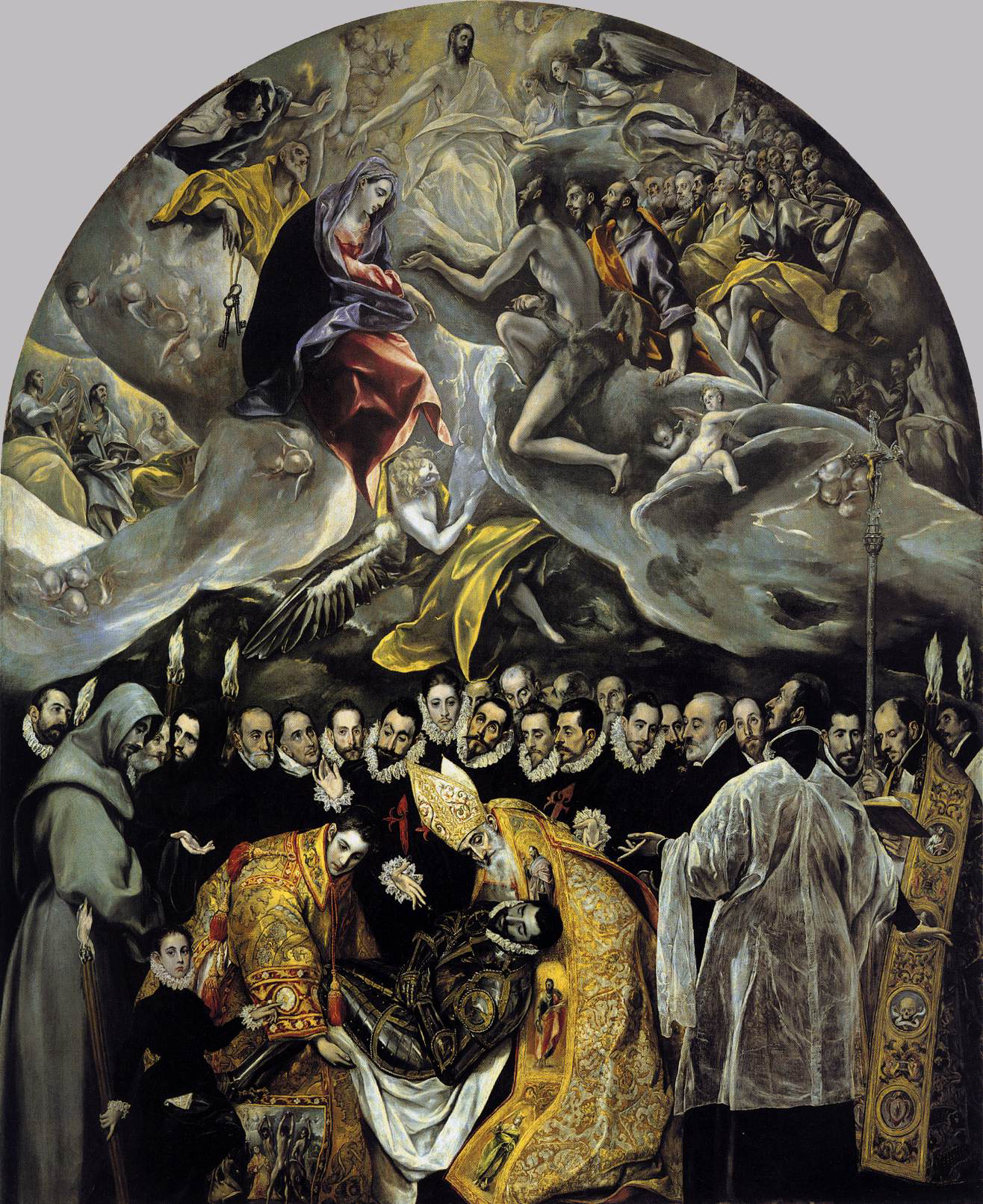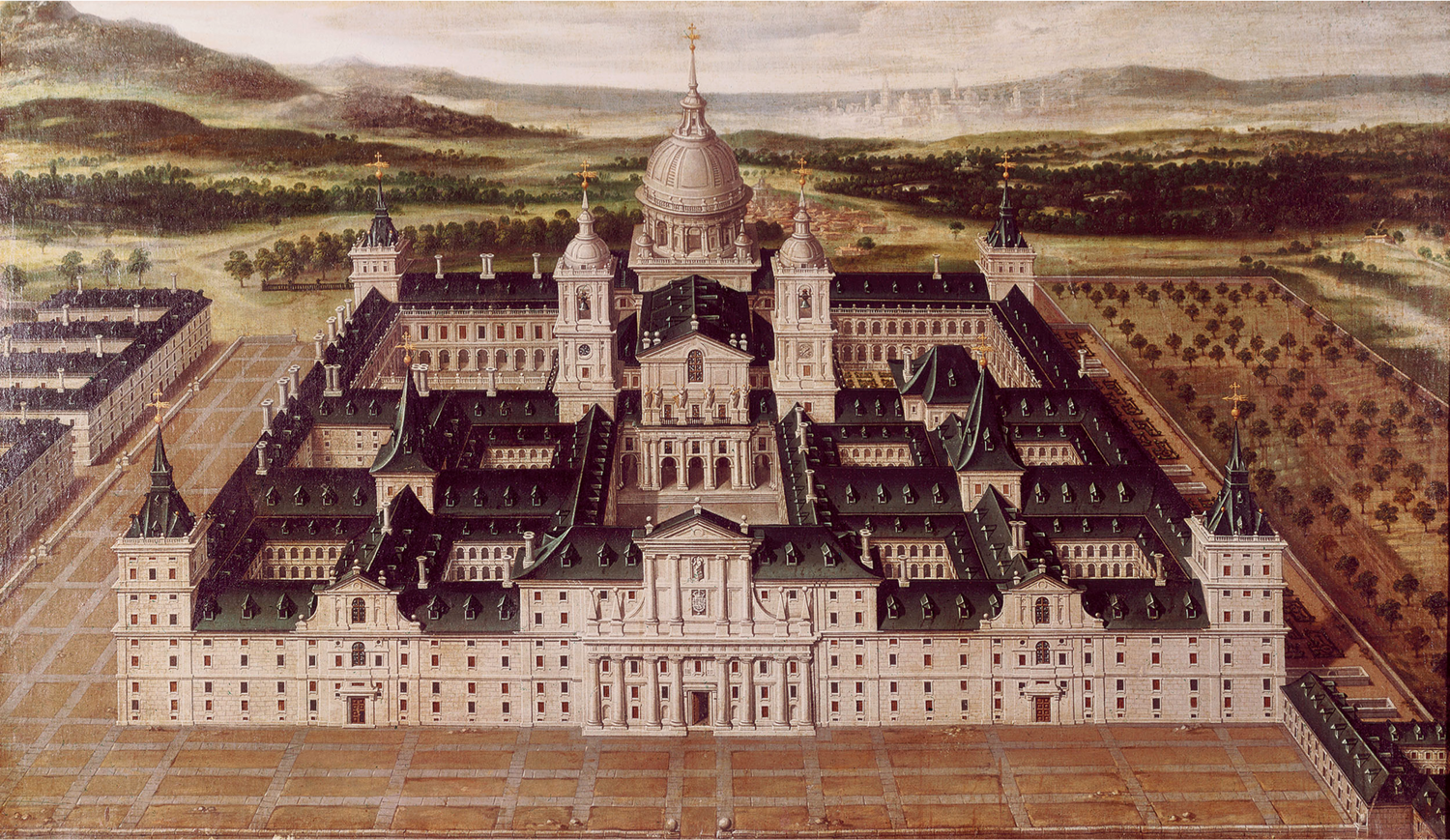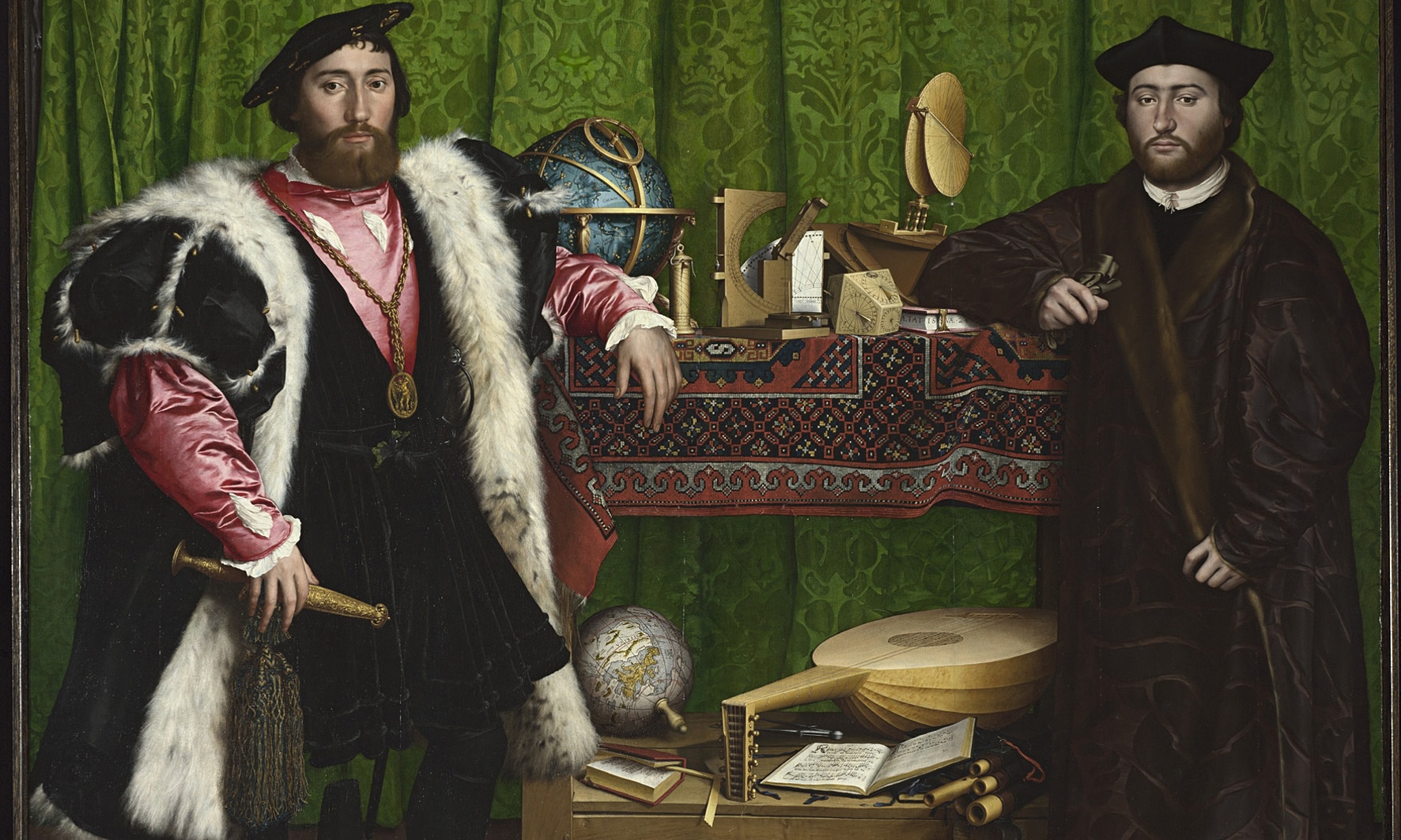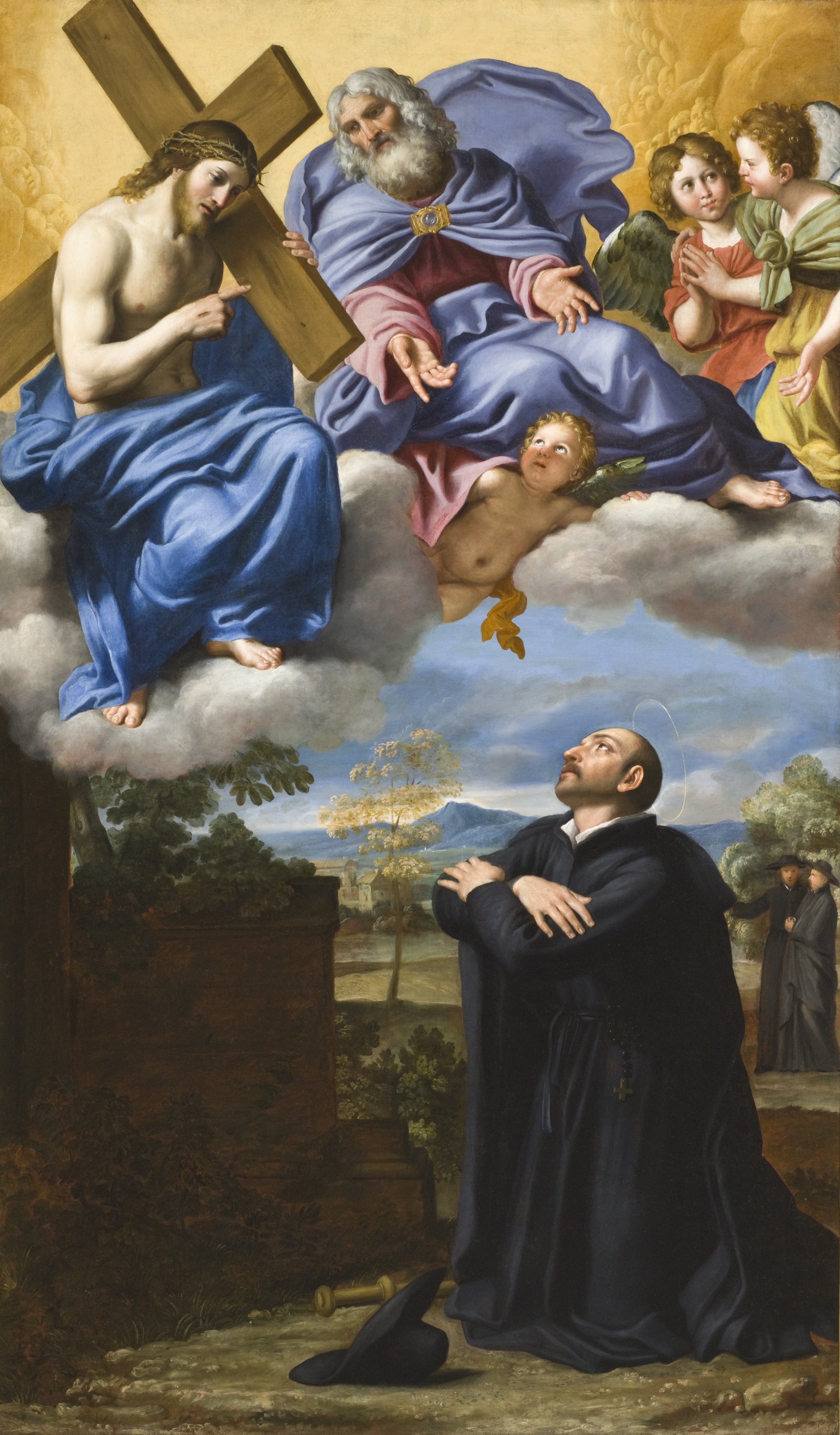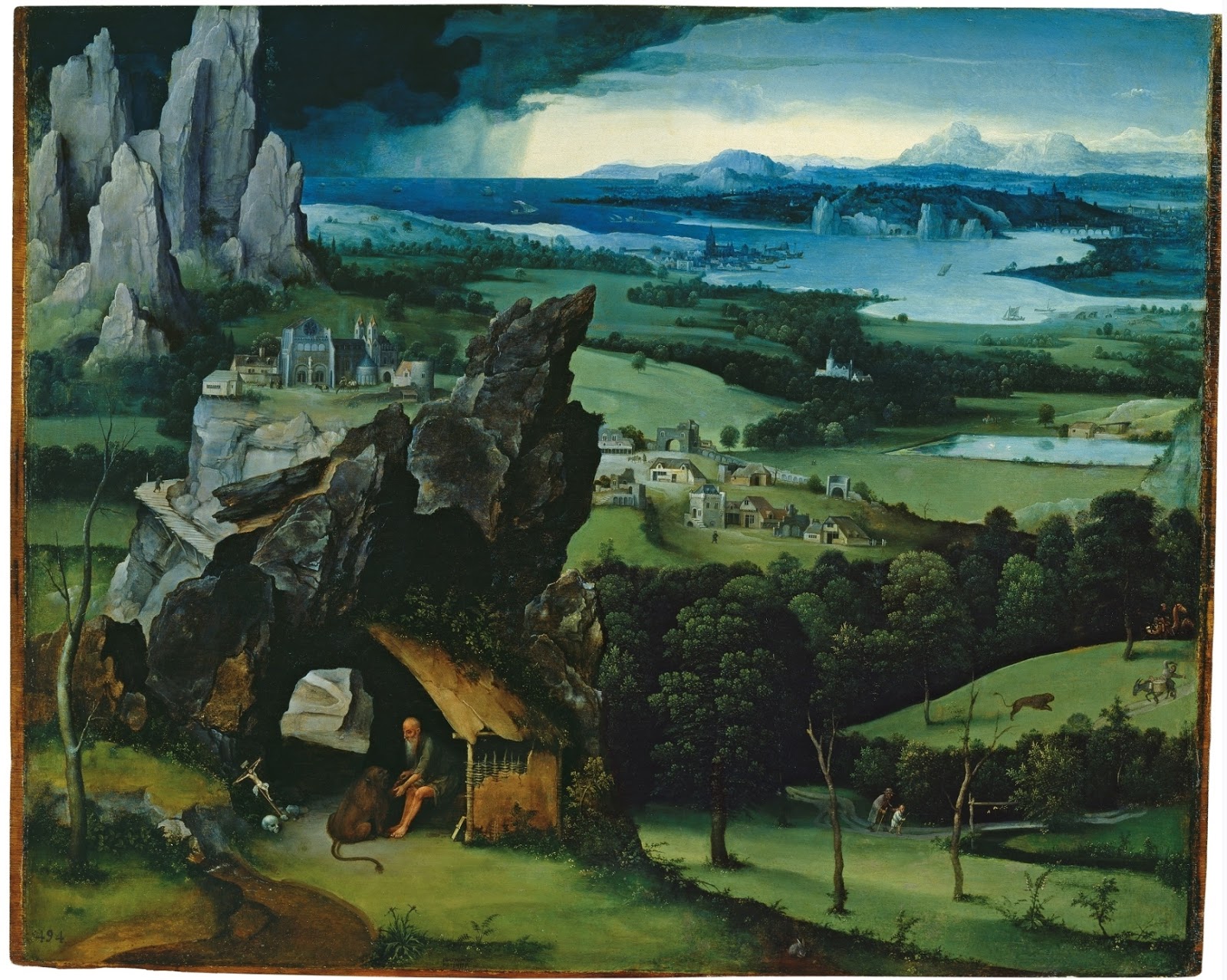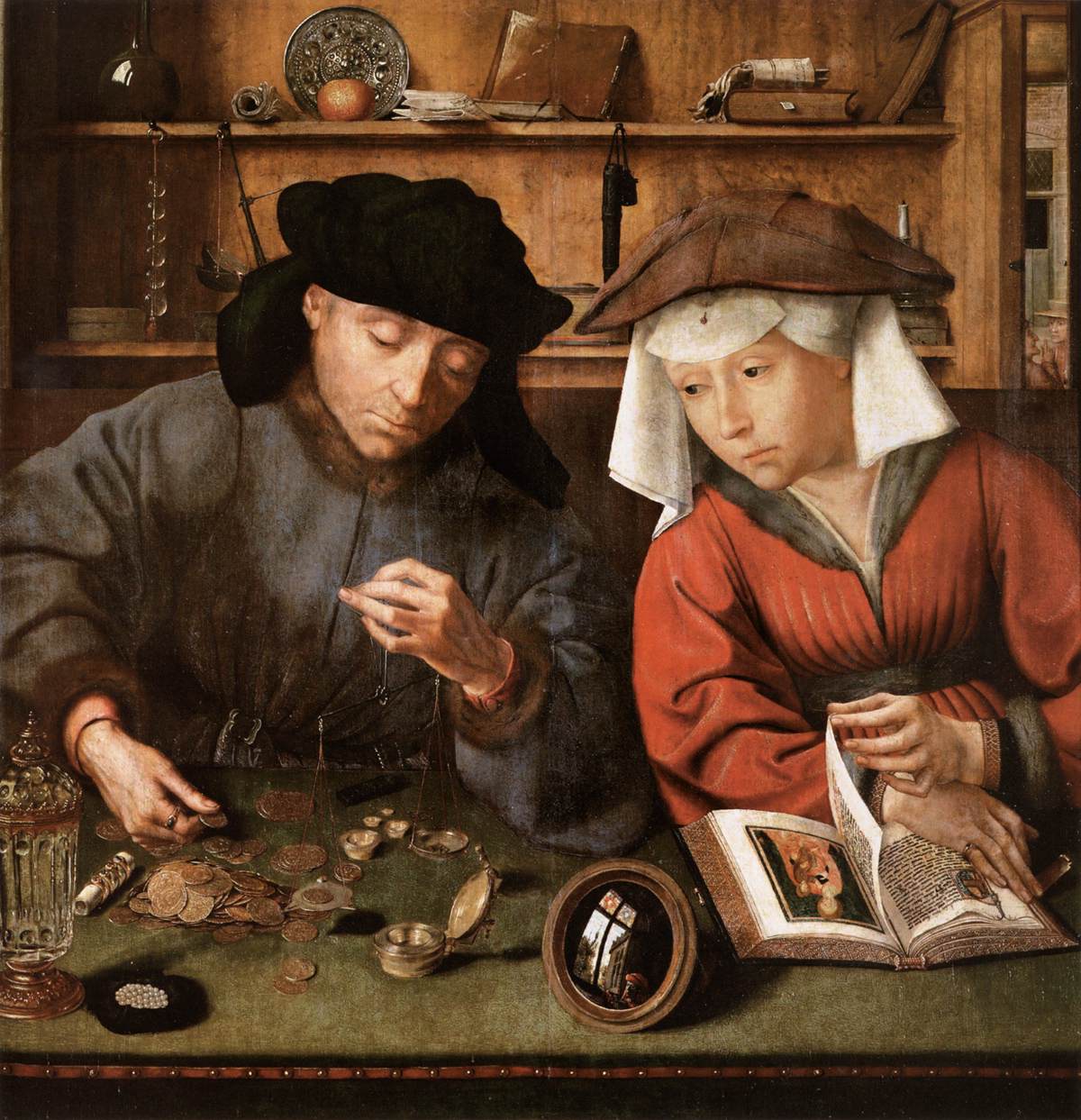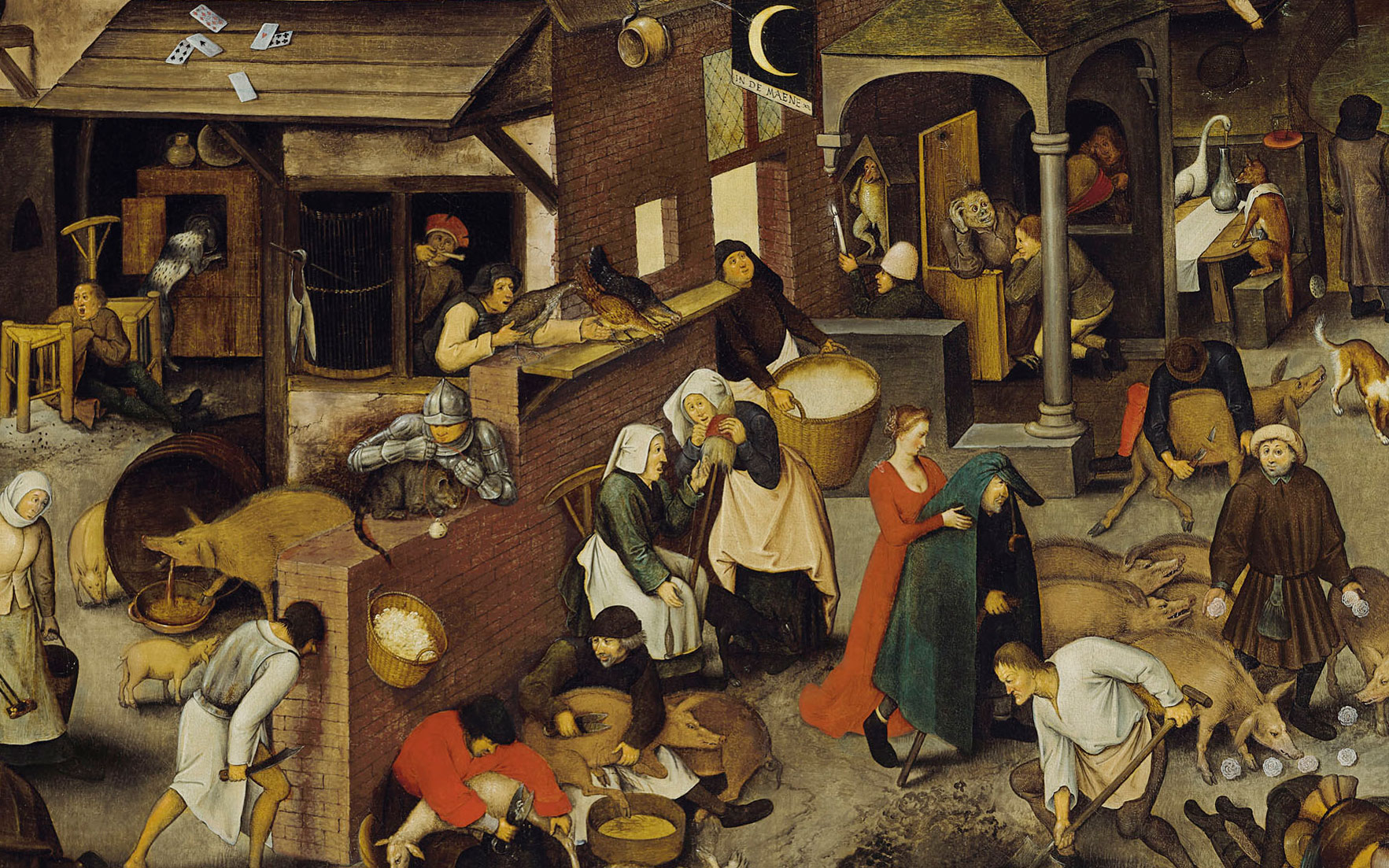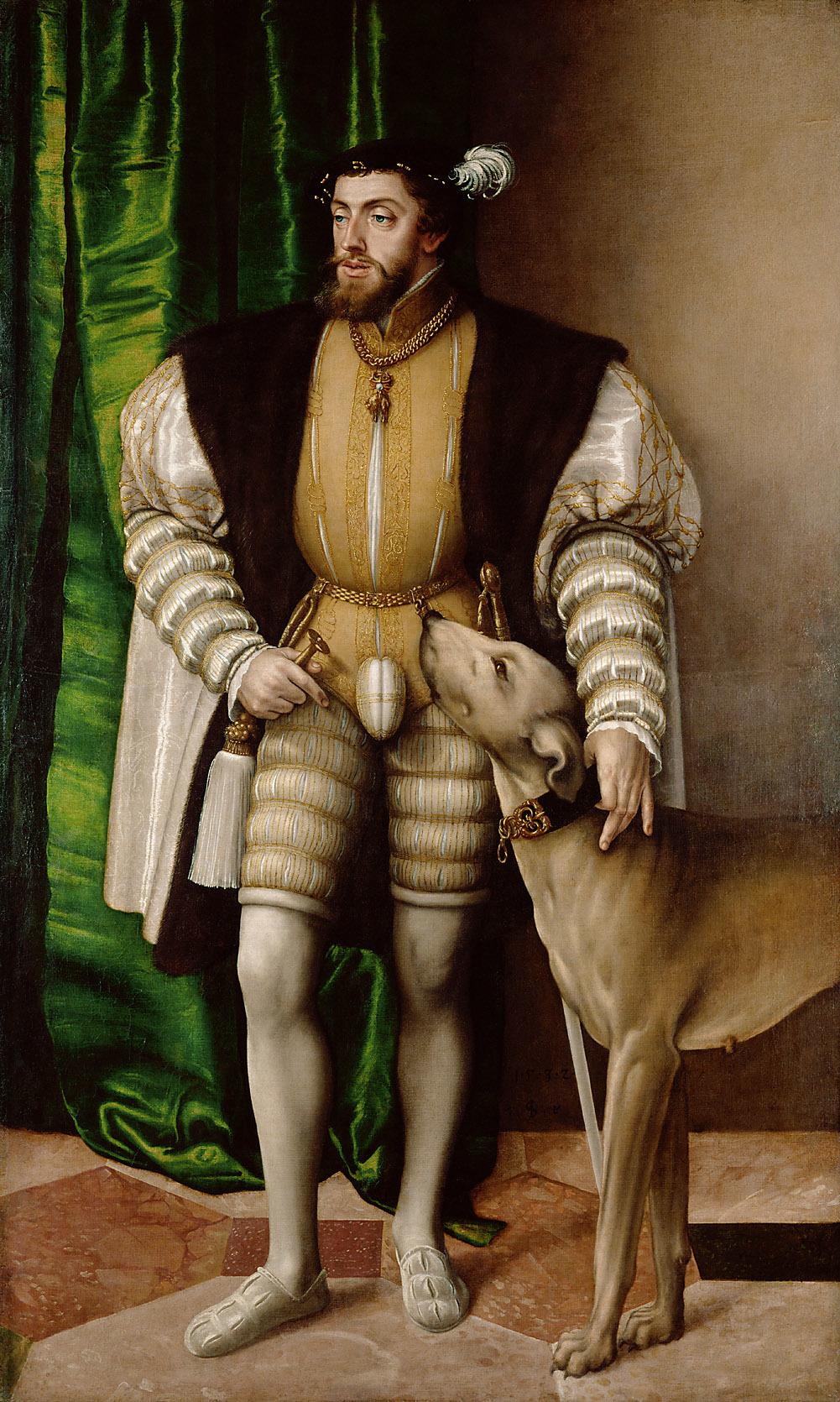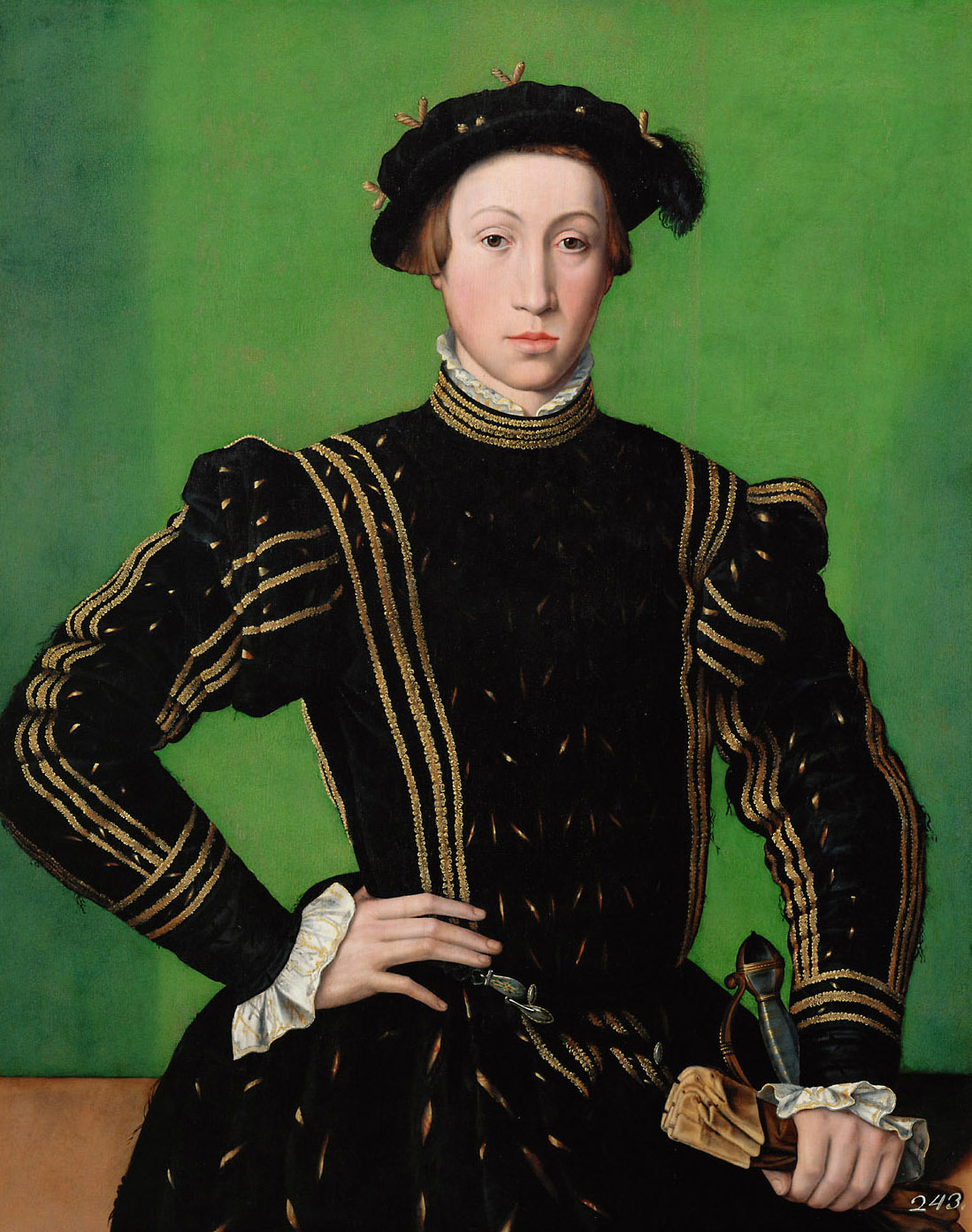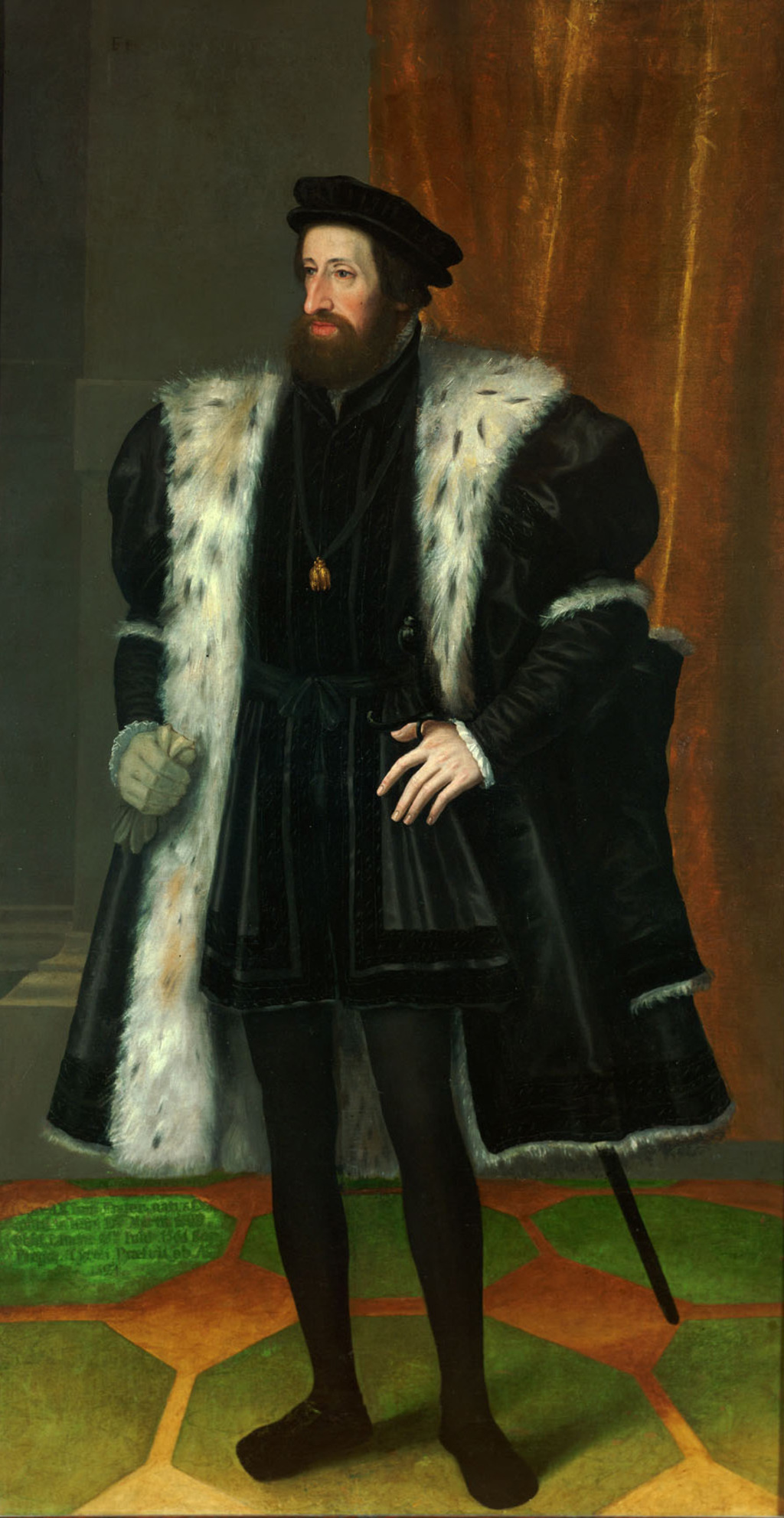CHAPTER 5
THE EMPIRE UNDER FERDINAND I AND MAXIMILIAN II
|
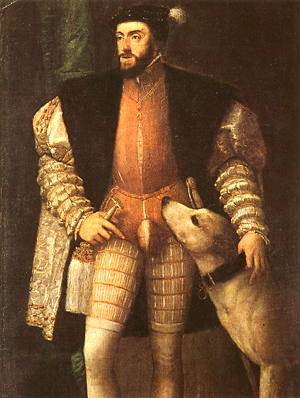 |
THE
palpably incomplete and far from sincere settlement of the year 1555 between
the Catholic and the Lutheran Estates of the Empire, known as the Religious
Peace of Augsburg, had not pretended to be more than a truce. It represented in
no sense an attempt to efface religious differences by means of a compromise.
The Catholicism which the enthusiasm of Cardinals and Popes was, with the
organized aid of the Jesuit and other Orders, proceeding to reinvigorate,
reconsolidate, regenerate, was not to be treated or bargained with; while among
German Protestants reconciliation almost ceased even to be an ideal with the
death of Melanchthon (1560). On the other hand, the agreement reached at
Augsburg did amount to a distinct understanding that, until some authoritative
decision--whether proceeding from a General Council, or a National Synod, or an
Imperial Diet--should have been accepted by Catholics and Lutherans alike, both
sides should be at liberty to exercise the religion of their choice. The
principle had now been clearly laid down that the final issue of the struggle
between the two recognized religious parties in the Empire must be determined
by a mutual agreement between them; pending which, the Estates professing
either form were equally to benefit by the institutions of the Empire, and to
be protected by its Common Peace. The essence of the Treaty lay in its adoption
of the principle of parity between the two rival religious parties --a
principle beyond which the horizon of the age in which the Religious Peace was
concluded cannot be said to have extended. No doubt this fundamental principle
would not have been conceded by the Catholics but for their apprehension that a
fresh resort to arms would be likely to end to their disadvantage; and thus the
whole agreement was, after all, but a concession to necessity, which a decisive
change in the balance of power in the Empire might at any time overthrow. The
Protestant Estates, for their part, cherished conceptions of their territorial
authority, which, should their power continue to grow, might lead to a complete
exclusion of Catholicism from their dominions. The history of the Empire during
the two generations which intervened between the conclusion of the Religious
Peace and the outbreak of the Thirty Years' War may be summarily described as a
struggle between the religious parties for territorial predominance.
MELANCHTHON |
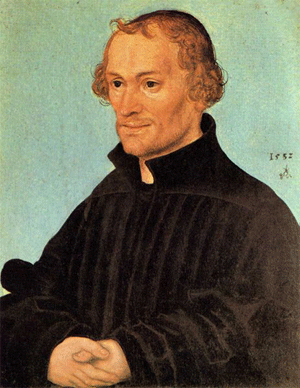 |
Still,
the guarantee of public law meant much even in this period of a dwindling
Imperial authority; and the degree of force attaching to it amidst fluid
political surroundings remains a notable phenomenon. The misfortune was that
the praiseworthy main principle of the Religious Peace was hedged round by
restrictions materially impairing its value, and--which was of even worse omen
for the security of the Empire--that rules and exceptions alike were enveloped
by a haze of uncertainty, the result partly of timorousness and partly of
design. In the first place, the Protestants benefiting from the Religious Peace
were defined to be those who adhered to the Confession of Augsburg. Herein
manifestly lay a twofold source of future discontents and troubles. For not
only was Calvinism entirely excluded from the purview of the Peace at a time
when it permeated the western borders of the Empire from Switzerland to the Low
Countries, and was on the eve of formal establishment within the Empire itself;
but, further, the compact drew no distinction between the original form in
which the Confession of Augsburg had (in 1530) been first presented and the
variations subsequently introduced into the Lutheran symbol by Melanchthon.
Above
all, the freedom of choice allowed by the Religious Peace was granted only to
the Estates of the Empire (together with the Knights), without being extended,
independently of their consent, to their subjects. This memorable restriction
inevitably had a different significance for each of the interests which it was
intended to satisfy. The Protestant Princes and governments regarded the cujus regio principle as
confirming the positive right assumed by them of establishing and administering
territorial Churches of their own; in the view of the Catholic it corroborated
their consistent claim to act as the suppressors of heresy in their dominions.
Europe in the XVIth Century
|
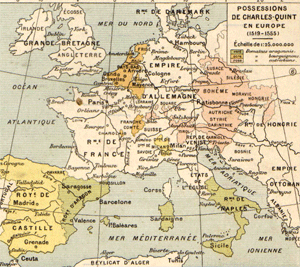 |
But the
terms of the Religious Peace concealed other shortcomings of a kind which in
such documents are not always chargeable to incompetent draughtsmanship.
It was not made clear whether governments which set up Protestant Churches
after the Treaty of Passau (Ausgust, 1552) should be
entitled to Protestantize or appropriate monastic or
other Catholic ecclesiastical foundations. Again, in those Imperial towns where
both forms of religion were practiced, each party was to retain possession of
its ecclesiastical property and rights in proportion to its relative numbers.
As more than three-score of such towns were to be found in Germany, and the
bulk of them in the south, where the diversity of religious creed was greatest,
a perennial source of discord was thus left open. But though this clause too
was to be productive of much trouble, the chief impediment to the maintenance
of the Augsburg Treaty lay elsewhere-namely, in the so-called reservatum ecclesiasticum,
which stipulated that a prelate renouncing Catholicism must at once resign his
ecclesiastical office. This "reservation" had never been accepted by
the Protestants, and had in the end only been included in the Peace as a
proposition promulgated by Imperial authority, reference being expressly made
to the objection raised against it by them. Meanwhile, in return for their
allowing the reservatum to be included in the settlement, the Protestants obtained the concession that
nobles, towns, and congregations in the territories of Spiritual Princes who
had previously enjoyed the privilege of Protestant worship were to continue
there to enjoy it; but this not even as part of the agreement, only as a
special declaration, which was not communicated to the Reicfwkammergericht as binding
upon its procedure.
|
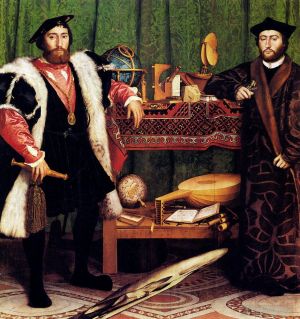 |
So
defective, then, so waterlogged, and so directly provocative of controversy and
conflict, were the instrument and its supplements, which were supposed to
regulate the relations between the Catholic and the Protestant Estates of the
Empire during a period of unreconciled differences
and of an accumulating pressure, from both within and without, against the
maintenance of peace. There were of course on the other side forces which
resisted that pressure, and to which it was largely due that a renewed outbreak
of the general religious conflict was so long postponed. The large and
important middle party to which the conclusion of the Treaty was mainly due,
was composed of both Catholic and Protestant Estates, Electoral Saxony forming
its backbone, and both Mainz and Trier belonging to it. This party was held
together, paradoxical as the statement may seem, by two mutually adverse
impulses-the Imperial and the territorial. A desire to maintain the authority
of the Empire and of its tribunals, natural to the long-enduring loyalty of
many German Princes and populations, cooperated with a consciousness among the
most intelligent of the Princes and their sagacious councilors, that the
princely authority had never before taken a step in advance comparable in
importance to the Religious Peace.
And, in
this connection, it should not be forgotten that the Diet (of Augsburg,
wherefrom Peace) of 1555, which accepted the Religious Peace also endeavored to
provide further guarantees for the maintenance of the general security of the
Empire--that Landfrieden,
on which its soundness as a political and social fabric depended. Many of the
princely Houses of this period were wanting neither in Imperial sentiment nor
in the consciousness that, as their feudal head, the Emperor might in certain
contingencies intervene very potently in their destinies. Under Ferdinand I,
and even under his successor, the cohesion of the Empire as a united polity was
still an object of practical politics; and the existing desire for union
displayed itself incidentally in the adoption of such a measure as the Imperial
monetary ordinance (Reichsmünzordnung)
of 1559, however imperfectly this was carried into effect. On the other hand,
the difficulties in the way of strengthening the principle of Imperial union
were considerable, quite apart from the cardinal religious difficulty. They
were of course mainly due to the growth of the territorial power of the
Princes, who everywhere, with the advice of the doctors learned in the Roman
law, from whom their councilors were in increasing numbers chosen, were
elaborating and fortifying their administrative systems, establishing Courts of
Appeal for themselves, and depressing an authority which had more than once
held its own against theirs--that of the territorial Estates (Landstände).
Another difficulty was however to be found in the increasing unwieldiness of
the Diet of the Empire. The political authority of the Emperor himself was now
specially circumscribed by means of the Compact of Election (Wahlkapitulatiari),
which furnished the Electors with an opportunity of securing to themselves a
distinct preliminary control of the internal government of the Empire and of
its foreign policy. But, more than this, the Emperor could not so much as
convoke the Diet without having previously obtained the consent of the Electors
at a meeting of their body (Kurfürstentag). While the importance of this exclusive
gathering necessarily rose with the advance of the territorial power of the
several Electors, the usefulness of the Diet for Imperial purposes continued on
the wane--excepting always with regard to the grant of aid against the Turk,
which still remained the one great chronic defensive need of the Empire. Since
the religious schism had ranged the political forces in the Empire so
distinctly under the heads of contending Confessions, grievances drawn up for
presentation at the Diet became in effect mere party manifestos, often arranged
by the Estates of each Confession at meetings of their own. The abnormal
dilatoriness of the Imperial Diet was in its turn attributable to the fact that
the Princes of the Empire, swollen with a sense of their expanding political
importance and consequently more and more disposed to determine for themselves
the successive steps of their policy, as a rule abstained from personal
attendance. Important questions could thus not be brought to an issue at the
Diets without a reference; and the amount of business left unfinished by them
at their breaking-up grew in proportion. This accumulation of arrears favored
the use of an expedient to which resort had been had already under Charles V,
the so-called Imperial Deputations (Reichsdeputationstag), composed of a certain selection of
Estates, including all the Electors except the King of Bohemia. When the
Estates of a single Circle of the Empire at their meeting (Kreistag) found their resources
inadequate for armed action, they might appeal for aid to the two Circles in
their nearest vicinity; and these might in their turn call in the assistance of
yet two other Circles. If the combined forces of all the five were still
insufficient, the Elector of Mainz might be called upon to summon a Reichsdeputationstag at Frankfort. This body might bid all the Ten Circles of the Empire combine for
the furnishing of military aid; but liberty was left to the Deputation to refer
the matter to the Emperor, who would then have to fall back again upon the
summons of a Diet.
|
 |
These
cumbrous devices made it difficult for the sectional group of Estates known to
the Constitution as Circles of the Empire to protect themselves against disturbance
from within or irruption from without by prompt and effective action, whether
separate or combined, of their own. At the same time the system of Execution (Exekutionsordnung)
now promulgated put no stop upon voluntary alliances between Estates such as in
one shape or another could only with difficulty be prevented. Nor had the Diet
of 1555 laid any restraint on the liberty, granted by its predecessor of 1495
to the Estates, of concluding even foreign alliances, if these were not
detrimental to the Empire. The practice had really established itself from an
earlier date, when these alliances had been in substance contracts for the hire
of soldiery. Yet sooner or later alliances formed within the Empire must take
the shape of organizations identified with one or other of the rival forms of
religion, and the schemes and rumors of alliances with foreign Powers, which
never ceased to be rife, would, so soon as each side saw its opportunity, be
translated into fact. Thus in matters political as well as religious the
Augsburg settlement had left the door open through which the spirit of conflict
must enter.
Finally,
it should be noted that, in conformity with the principles adopted in the
Religious Peace and in the new Exekutionsordnung, the Diet of 1555 remodeled the chief
permanent judicial tribunal in the Empire, and the only one of which the
composition was determined in common by the Emperor and the Estates--the Reichskammergericht.
Adherents of the Lutheran Confession, trained at Lutheran universities, now sat
among its judges by the side of Catholic colleagues, though the principle of an
actual numerical equality between them was not yet adopted, and the presiding
judge continued to be always a Catholic. The Reichskammergericht was now
empowered to regulate its own procedure by "common decrees" (gemeine Bescheide),
to which a binding force attached until they were revoked at an annual
visitation by an Imperial deputation; and in these visiting commissions also it
was provided that the Lutherans should be regularly represented. Thus in the
judicial sphere too an advance had been made towards religious parity. From his
own territorial dominions Ferdinand I sought to exclude the influence of the Reichskammergericht so far as possible. Down to 1559 he had endeavored to exercise supreme judicial
power in the affairs of the Empire as well as in those of his own dominions
through the Aulic Council (Hqfrath) established by
Maximilian I; but in this year he deprived it of all territorial jurisdiction,
so that it now became an Imperial authority proper (Reichshofrath). The competence of
this tribunal, and of the Emperor's ordinances concerning it, was steadily
denied by the Estates; nor was it till the Peace of Westphalia that it received
full recognition and became a permanent part of the Constitution of the Empire.
POPE PAUL IV (1555-1559) |
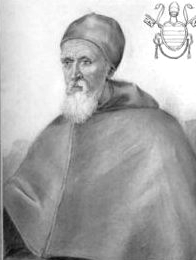 |
In all
these arrangements and rearrangements, the Emperor Charles V had no hand. He
had never understood the German Reformation and its adherents, whom after the Schmalkaldic War he described as ad gremium Ecclesiae redeuntes,
and he showed his disapproval of the principle of the Religious Peace by
holding entirely aloof from the negotiations for its conclusion. From 1553
onwards he had really transferred his responsibility as Emperor to his brother
Ferdinand, whose election as Roman King had taken place in 1531; and his formal
abdication of the Imperial throne followed in 1558. The aged Pope Paul IV
(1555-9) was at the same time able to give expression to his detestation of the
compact with the heretics by refusing to acknowledge the accession of a Prince
of the detested House of Habsburg, who had materially contributed to its
conclusion. But Paul's successor Pius IV (1559-65) immediately recognized the
new Emperor, who in his turn promised the traditional obedience to the Holy
See. Already before his actual accession to the Imperial dignity Ferdinand had
proved himself a Prince of a truly politic cast of mind, who, though without
constructive genius (as indeed the Religious Peace itself showed), possessed a
remarkable capacity for learning the lessons to be drawn from facts. Curiously
enough, while the elder brother, who had passed the first seventeen years of
his life in the Netherlands, had never entered into German ways of life and
thought, the younger, born and educated in Spain, proved capable of accommodating
his own political action to the demands of his position at the head of the
German nation.
POPE PIUS IV(1559-1565) |
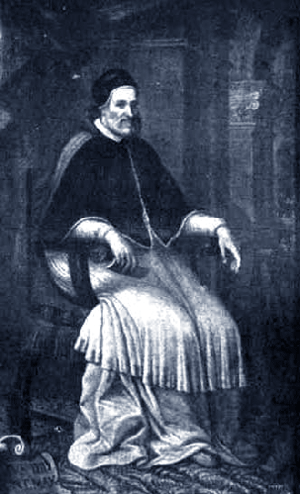 |
No doubt
the relations between him and the Germans had been drawn closer by the attempt
of Charles V to secure the succession in the Empire after Ferdinand to his own
son Philip, although Ferdinand's son Maximilian, the consort of Charles V's
daughter Maria, had been already acknowledged as successor to the Bohemian
Crown. Though Ferdinand had been obliged (1551) to promise his support to the
scheme, in his heart he rejoiced at its frustration--to which he had very
possibly himself contributed. If he never became quite a German either in mind
or in speech, there could be no doubt as to his desire for peace, and for the
maintenance of law and order. And even as to the all-dominating question of
religion, he bore himself alike with sincerity and with moderation. In his
public acts as well as in his private life he showed himself a good Catholic;
and his desire to strengthen the Church by means of an inner purification was
beyond doubt the motive with which he introduced the Jesuits into all his
lands. Nor was the policy pursued by him in the closing years of the Council of
Trent (1561-3) inconsistent with this purpose. He not only asked from the
Council concessions as to disputed points of practice, conceived in the broad
and generous spirit of the Erasmian Pflug, but laid before it proposals for practical reforms
which would have increased the popular influence of the Church in Germany, and
have led both to the advance of education and to the improvement of the
condition of the poor. In his personal relations he came to show a remarkably
tolerant spirit, and even admitted Lutherans as members of his Court and
household, without appearing to take any notice of their religious profession.
All that he demanded from those around him was purity of morals, of which,
different in this respect also from his more famous brother, he set an
admirable example in his happy family life. Such was the goodwill conciliated
by the mildness of his disposition, the probity of his conduct, and the
trustworthiness of his character, that when his end drew near a Venetian
ambassador foretold that it would be saddening to everyone.
|
.gif) |
Before
Ferdinand had formally taken on himself the burden of Imperial responsibility
another Venetian report had described him as "loved, but not feared, by
some of the races over which he ruled; feared, but not loved by others; and by
the Hungarians neither loved nor feared." Of Hungary he never, except for
a brief period immediately after his coronation as King in 1527, had under his
sway more than a fragment. His vanquished Transylvanian opponent, the so-called
"national King" John Zâpolya, became a vassal of Sultan Solyman II,
who refused his assent to the pacification between the two rivals; and in 1541,
the year following that of Zâpolya’s death, there set
in the era of Turkish dominion, which continued for nearly a century and a
half. During all these years--whether they were accounted years of war or of
peace--Hungary remained the battle-ground of the Powers which, in the course of
their unceasing strife for its possession, were constantly shifting their
relative positions. Almost throughout Ferdinand's public life the Turkish
peril, and the necessity of defending the portion of Hungary held by him, as
the bulwark of the Austrian lands and of Germany at large, preoccupied him in
Council and in Diet. The Estates of the Empire took the danger more coolly;
Hungary formed no part of the Empire, and they usually measured the sacrifices
which they were prepared to make accordingly. In his own dominions, where
Ferdinand did his best to establish a uniform taxation for their defense, his
whole system of expenditure was clogged by the perennial Turkish warfare; he
could collect military forces for no other purpose, nor spend money upon
necessary diplomatic agencies. It was not till 1562--two years before his
death--that he seemed at last to have reached an actual breathing-time in his
relations with the Ottoman Power by the conclusion of a peace for eight
years--as a matter of fact it only lasted four--containing the customary
humiliating condition of the payment of an annual tribute to the Sultan. At the
close of the sixteenth century, the King was master of less than a quarter of
the whole former Magyar Kingdom and its dependencies, while more than one-third
of it was under direct Turkish rule, and nearly two-fifths subject to the
Sultan's vassal, the Voivod of Transylvania.
|
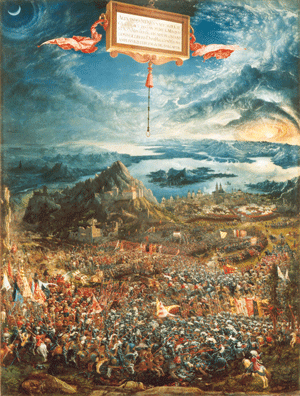 |
Besides
suffering from the social disorder and distress inseparable from the periodical
inroads of a foe intent above all upon the rape of human beings for his
military service and his harems, the "royal" portion of Hungary
remained during Ferdinand's reign politically unsettled. He was never
able--even when, in 1563, he at last obtained the coronation of his son
Maximilian as his successor on the throne--to secure a recognition of the claim
of his dynasty to the right of hereditary succession; on the other hand he at
least asserted the principle that the administration of the kingdom should in
the absence of the King be in the hands of a governor appointed by himself, and
not in those of a Palatine elected by the Diet. In Hungary as elsewhere
Ferdinand's internal difficulties centered in his relations to the Estates; and
nowhere were they more intensified by the question of religion. The Lutheran
Reformation had rapidly penetrated into both Transylvania and Hungary proper,
establishing an ecclesiastical organization of its own, in the former in 1545,
and in the latter in 1550. The Calvinist form, too, of the Reformed religion
had already spread by the side of the Lutheran; it was formally organized in
Transylvania in the year of Ferdinand's death and in Hungary proper two years
later. During the whole of his reign Protestantism advanced unchecked in both
countries; nor was it till a few years after his decease that a successful
effort was made in Hungary by the Catholic Reaction to arrest this progress.
In Bohemia,
while King Ferdinand was chiefly engaged in defending Hungary and Austria
against the Turks, the Diets were likewise largely occupied with religious
questions. Lutheran doctrines had continuously spread among the Utraquists; and the Bohemian Brethren too-a relic of the
sectarian life of earlier centuries revived in the early years of the
sixteenth-had discovered and openly avowed their near affinities to
Lutheranism. Thus, when the Schmalkaldic War broke
out, the Bohemian Estates were most unwilling to grant aid to the King in
furtherance of the Imperial policy; and a serious constitutional conflict
ensued. The stern reassertion of the royal authority at the "Bloody
Diet" of August, 1547, ushered in a period of deceptive tranquility. The Estates
consented to acknowledge Ferdinand's son Maximilian as heir and successor to
the throne, provided that during his father's tenure of it he took no part in
the affairs of the realm (February, 1549). But they could not be induced to
restore to the churches and convents the lands of which a long process of
secularization had deprived them; and the conflict of religious beliefs
remained unextinguished.
The
accession of Ferdinand as Emperor led to no material change in the affairs of
Bohemia, though his firm and conciliatory conduct of them helped to strengthen
his authority. In 1562 the Estates agreed to the coronation of Maximilian and
his Spanish consort, the ceremony being performed by the newly-appointed
Archbishop of Prague (Anton Brus), whose office had
remained vacant for a century and a quarter, while nearly all the landed
property attached to it had long been dispersed into secular hands. The efforts
of this prelate and his colleagues at the Council of Trent were steadily
directed to obtaining for the Emperor's Bohemian subjects the concession of the
Cup, by means of which he still hoped to bring about a reunion of Utraquists and Catholics. In the last year of Ferdinand's
life, after an elaborate enquiry, this concession was granted to Bohemia (as
well as to certain other parts of the Empire) by Pope Pius IV; and from this
time forward the Cup--to the Bohemians a symbol of high national as well as
religious significance--was in that country denied to the demand of neither
Catholic nor Utraquist, even in the Jesuit Churches.
Yet Ferdinand gave a steady support to the work carried on in Bohemia by the
Catholic Reaction. The Jesuits, with Canisius at
their head, found their way to Prague as early as 1555, and their College,
established here in the following year, became a permanent nucleus of their
indefatigable propaganda, and a rival to the Utraquist University, where many of the professors were more or less openly Lutherans.
Some years earlier the administrative instincts of Ferdinand had provided the
means of checking heterodox publications by the institution of a censorship.
The most
promising field of operations for Ferdinand's centralizing policy might have
seemed to be the five duchies of Upper and Lower Austria, Styria, Carinthia,
and Carniola, with their dependencies; but the Turkish wars, and the absorption
of his chief administrative energies in the provision of means for their
prosecution, made it impossible for him to organize effectively the government
of his hereditary dominions, or to develop their economical resources. Still,
he never lost sight of his purpose. In 1556 he succeeded in assembling a
Committee of the Diets of the five duchies; and in the same year he instituted
a permanent military Council (Hqfkriegsrath), distinct from that charged with the general
affairs of his dominions.
XVITh Century Germany
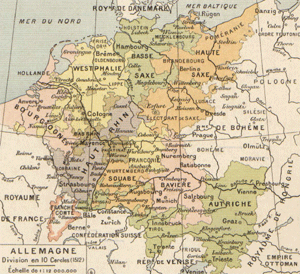
|
In
religious matters, the general drift of opinion and sentiment was at least as
antagonistic to Ferdinand's own in Austria as it was in Bohemia and Hungary. To
the ecclesiastical grievances reiterated by the Austrian Estates at their
combined Diets, from 1530 onwards, and to the open demand in 1541 of nobility
and towns for the free exercise of a form of faith virtually corresponding to
the Augsburg Confession, Ferdinand had declined to yield; but he was gradually
coming to recognize that the pressure was irresistible. During the whole of the
latter half of his period of rule (and indeed for some time before) the
nobility and the towns assumed not only the ordinary exercise of Church patronage,
but also the general control of Church revenues. Admittance into the Austrian
dominions was freely granted to a strange mixture of doctrinal teaching; and
not only was the use of the Cup by the laity authoritatively permitted to the
Austrian Estates (1555-6) some years before this concession was approved by
papal decision (1564), but the marriage of the clergy was allowed as an
ordinary practice. Throughout the Austrian territories, as with perhaps rather
more of restraint in neighboring Bavaria, there ensued, together with a chaotic
fluidity of religious beliefs and an anarchy in the forms of religious worship,
a relaxation of social order and moral discipline among both clergy and laity.
It was, therefore, in the true spirit of the Catholic reform that, as has been
seen in an earlier passage of this work, Ferdinand in 1552-the year of the
foundation of the Collegium Germanicum in
Rome--summoned from Ingolstadt the Dutch Jesuit Canisius (Peter Kanes) and his companion Goudanus,
and, after a year's residence, incorporated them in the University of Vienna,
where Lutheran sympathies had hitherto prevailed. The plain and popular vein to
which Luther himself owed so much of his power was not wanting in Canisius; but with an eloquence that secured to him the
goodwill of large audiences in Vienna and elsewhere in the Austrian duchies he
combined a singular aptitude for influencing the cautious mind and balanced
judgment of their ruler. During his later years Ferdinand confided in Canisius as his chief adviser in matters of religion, and
gave a ready support to the revival brought about in the ecclesiastical, and
more especially in the educational, life of the Austrian populations by the
great Jesuit's indefatigable labors. His efforts as missionary and Provincial
must be reckoned among the forces making against a permanent reconciliation of
the contending religious parties and interests in the Empire, or even a
prolonged truce between them.
|
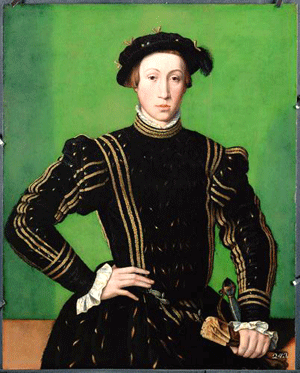 |
Such,
then, were some of the elements in the personal action of Ferdinand I, and in
his relations as a territorial ruler to the problems which largely occupied the
Empire during his reign, and in particular to the religious difficulty which
went near to swallowing up all the rest. As yet, during Ferdinand I's tenure of
the weakened Imperial authority, there seemed some prospect of a settlement of
questions arising out of the Religious Peace within the limits of the Empire,
by its own reorganized machinery, and exclusively in the interests of itself or
its members. This prospect grew less hopeful already during the reign of
Ferdinand I's son, Maximilian II; and before the two decades, or thereabouts,
with which this chapter is concerned had actually come to an end, the religious
struggle in Europe at large was already approaching its acutest and intensest phase, in which the Empire was no longer to
retain the control of its own destinies.
In the
first instance, then, the progress of the religious struggle, or the arresting
of that progress, must depend upon the distribution of political power and
influence among the more important Princes and other Estates of the Empire, and
upon the attitude taken up by them individually in matters ecclesiastical. Of
the four Temporal Electors the Emperor, as King of Bohemia, was the only
Catholic. Of the three Protestant the most important was the Elector Augustus
of Saxony, Maurice's brother, to whose calculated conservatism more than to any
other cause was due the maintenance of the provisional settlement in the Empire.
A powerful secret motive of the second Albertine Elector's loyalty was no doubt the possibility of the restoration, by an
Emperor ill-disposed towards him, of the Ernestine branch of the House of Wettin. During the whole of his long rule (1553-86), he was
steadily intent upon the increase and consolidation of his territorial power.
Although he took a personal interest in religious controversy, both his action
in the affairs of the Empire and his abstinence from any attempt to further the
progress of Protestantism beyond its borders show how among the German Lutheran
Princes territorial considerations were already beginning to overpower those of
religion. Though he had some learning, the humanistic influences which had
still been strong with his elder brother were in Augustus and his Danish
consort Anna--a very Martha among princesses--exchanged for a beneficent care
for the organization of the material resources of his Electorate. For the rest,
while he was careful to observe the principles of Roman law in dealing with the
affairs of his subjects, he closely adhered to Germanic (i.e. feudal) usage in
the maintenance of his princely rights and customs.
In his
religious beliefs Augustus of Saxony was a convinced Lutheran, but not, at
first, of a rigid cast. So long as Melanchthon lived, the Elector was ready to
follow his elastic teaching; and the Corpus Misniacum (1559) was compiled in this sense. At a later time he changed his dogmatic
standpoint; but under Ferdinand I, and nearly to the close of the reign of
Maximilian II, Augustus favored moderate Lutheran views, such as did not wholly
preclude an understanding between the two main divisions of German
Protestantism. Herein again he was influenced by the strongly marked views and
conduct of the head of the Ernestine branch of the Saxon House. In 1557 Duke
John Frederick summoned to the Ernestine University of Jena, and at the same
time to the chief supervision of the Thuringian Church, the foremost teacher among the rigidly orthodox Lutherans, Matthaeus Flacius, called from
his place of birth, Illyricus. Not less vigorous than
voluminous as a controversialist, Flacius was no
doubt sustained by the conviction that he was a combatant for the truth, in
face of which there are no adiaphora; and to him is
largely to be ascribed the position of absolute intransigency which Lutheranism
assumed alike towards Rome and towards Geneva, and to any form of dogma not
distinctly adverse to Calvinistic conceptions.
Wilhelm von Grumbach (1503-1567) |
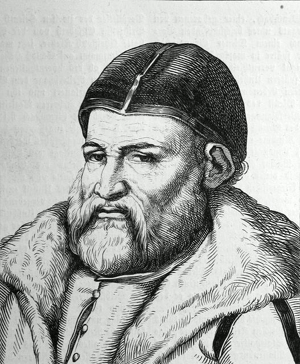 |
The
jealousy between the Ernestine and Albertine lines,
and more especially between their respective chiefs, was by the restless energy
of a revengeful and ambitious intriguer fanned into a flame which long menaced
the peace of the Empire. In their origin the so-called Grumbach quarrels (Grumbachsche Händel) are
significant of the bitter jealousy still animating the nobility, and in
Franconia, where Wilhelm von Grumbach (1503-1567) was at home, the Knights,
against the growth of the power of the territorial Princes. Grumbach had a
long-standing quarrel with the Bishop of Würzburg, Melchior von Zobel, whose election he had on a former occasion thwarted
and who, in the end, after the outlawry of the truculent condottiere Margrave
Albert Alcibiades of Brandenburg-Culmbach, had as
territorial prince seized his follower Grumbach's estates. It was at this time--in 1557--that Grumbach found a new patron in the
dissatisfied John Frederick at Gotha; and in 1558 he carried out a long
meditated raid upon the Bishop of Würzburg, who was killed in the fray. In the
same year Grumbach, not content with John Frederick's protection, entered into
the military service of the French Crown, and began to busy himself with
concocting schemes both against the new Bishop of Würzburg and for supplanting
Augustus as Elector by the Ernestine Duke, and Augustus' brother-in-law, King
Frederick II of Denmark, by Duke Adolphus of Holstein. In accordance with the
gross superstition of the age, which the Lutheran Reformation had by no means eradicated,
magical charms were directed by Grumbach and his patron against the lives of
the Elector Augustus, the Bishop of Würzburg, and the Emperor; and a Gotha
peasant boy as "seer" regularly reported angelic communications. In
obedience to one of these, Würzburg was attacked and taken by the confederates,
and the restoration and augmentation of Grumbach's estates forced upon the Chapter, whose consent the Bishop had to confirm
(1563). At last the Emperor intervened by placing Grumbach under the ban of the
Empire. But neither the calling of a Deputationstag, nor the Emperor's injunction to John
Frederick to renounce the protection of Grumbach, was of avail. On the other
hand, the attempt of the Franconian Knights to use
the occasion for pressing their grievances came to nothing, though the Swabian Knights were inclined to follow suit; and the
Württemberg government called a conference of Palatine, Bavarian, and Baden
councilors to Maulbronn to join in preventive
measures (1564). Yet when, at this time, Maximilian came to the throne, John
Frederick and his protégé were still residing unhurt at Gotha, where the latter
was spinning fresh webs, designed to entangle Frederick II of Denmark
(1534-1588) in northern complications, and to isolate the arch-foe, the Elector
Augustus.
Frederick II of Denmark
(1534-1588)
|
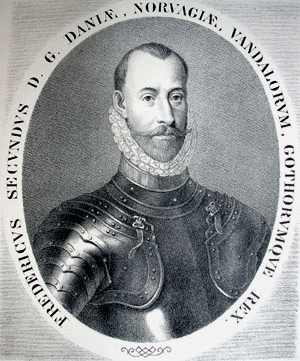 |
Grumbach’s schemes grew wilder as they expanded, and
the Imperial crown itself was promised to his Ernestine patron in a vision.
Thus the new Emperor was induced by Augustus to renew the ban of the Empire
against Grumbach and pronounce it upon John Frederick; and, after in vain
looking for assistance to the Franconian nobility and
Knights, to Brandenburg, to the Scandinavian North, to France, and even, it was
said to the Netherlands, the ill-starred pair were at last--early in 1567--run
to earth by Augustus of Saxony, at the head of an executive army of some 16,000
men. Gotha capitulated on April 15; Grumbach was drawn and quartered in the
market-place; and John Frederick passed into imprisonment in Austria, where he
died in 1595. Vengeance descended on all who had had a share in Grumbach's schemes; while the Ernestine lands were
repartitioned for the benefit of John Frederick's brother, John William. The
entire story, which occupied contemporary attention to an extraordinary extent,
casts a lurid light upon the insecurity of the institutions of the Empire at
the time when the principle of territorial sovereignty was establishing itself
there with sober but ruthless persistency. The victory of the Elector Augustus
and his ally the Bishop of Würzburg redounded entirely to the advantage of that
principle, and had no concern with the religious question.
In the
period following upon the promulgation of the Religious Peace, Augustus is
found steadily opposed to any tampering with its provisions, though unwilling
to join in efforts to extend the Protestant sphere of influence. At first he
took a leading part in the movement for the cancelling of the objectionable reservatum ecclesiasticum;
but he failed to maintain this opposition with his habitual tenacity. At the
same time, he acted with promptitude and decision, where the episcopal authority came into contact with his own. His
territories surrounded the sees of Meissen, Merseburg, and Naumburg on all
sides; and in 1555 he took advantage of a vacancy in the see of Meissen to introduce a Bishop of yielding disposition and Protestant
tendencies. At Merseburg in 1561 an obedient majority
of the Chapter postulated the Electors son Alexander (then eight years of age)
as their Bishop, and in the absence of a papal confirmation the father carried
on the administration of the diocese in the child's name. Finally, on the death
of the wise Erasmian Bishop Julius Pflug of Naumburg in 1564, the
Chapter there was constrained to postulate the same Prince; and after his death
in the following year both Chapters committed the administration of their
respective sees to the Elector. On the resignation of the Bishop of Meissen the
same course was pursued; and before he died the Elector might deem himself
completely master in what he regarded as his own house.
|
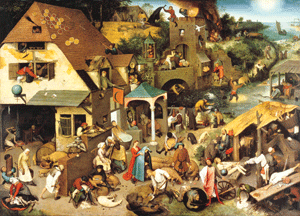 |
The
Elector Joachim II of Brandenburg (1535-71) was in complete accord with the
settlement of the Religious Peace, and, though in a more or less timorous
fashion, may be said to have generally seconded the policy of his Saxon
neighbor. He had admitted the Reformation into his lands without precipitancy
and in no spirit of animosity against Rome. He simply felt (as had his uncle
the Cardinal-Archbishop Albert of Mainz, who also held the sees of Magdeburg and Halberstadt) that the current was
not to be resisted. The religious change by no means impaired his loyalty to
the Emperor ; he held back from the League of Schmalkalden;
and after the Religious Peace he at first took no part in the consultations
among the Protestant Estates, while there was much mutual goodwill between him
and the Emperors Ferdinand and Maximilian. But the question of his territorial
power was with him, too, paramount. In the case of the sees of Brandenburg, Havelberg, and Lebus the Electoral House had long assumed the right of nominating their Bishops, and
here no voice was raised for the reservatum ecclesiasticum. But Joachim was also determined that
the great archbishopric of Magdeburg and the bishopric of Halberstadt,
whose occupants sat among the Princes of the Empire at the Diet, should be
permanently in the hands of his House. Fortunately for this purpose, there had
been no difficulty in securing from the more than half Protestant Chapters the
election of Joachim's second son Frederick to both sees; and on his death soon
afterwards (in 1552) the third son Sigismund succeeded in his stead. Under him
both Magdeburg and Halberstadt were effectually Protestantised (1561-3); but, on the pretence that the
convents in these dioceses had remained Catholic, a conflict with the reservatum ecclesiasticum was
outwardly avoided. On the directly contrary plea that the provision was
inapplicable to a see which had been Protestant long before his election,
Joachim II's grandson, Joachim Frederick, held the archbishopric from
Sigismund's death in 1566 till his own accession to the electorate in 1598,
while Halberstadt was made over to the infant prince
Henry Julius of Brunswick-Wolfenbüttel. In his
religious opinions the Elector Joachim II was inclined to a moderate
Lutheranism; his able chief councilor Lampert Distelmeyer had himself formerly been a pupil of
Melanchthon.
Prusia.-The fortress Ordensburg Marienburg, founded in 1274, the world’s largest brick castle and the Teutonic Order's headquarters on the River Nogat. |
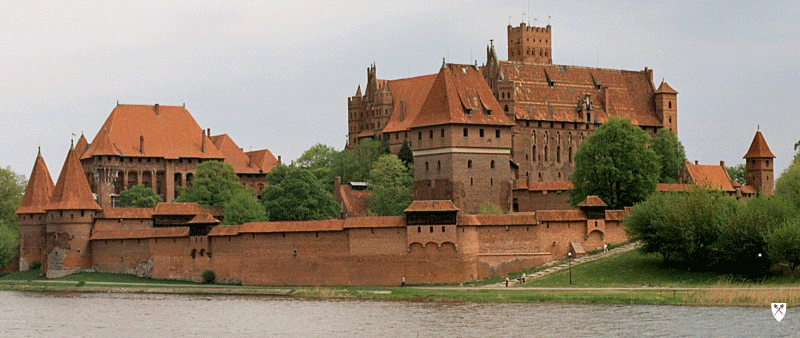 |
East Prusia |
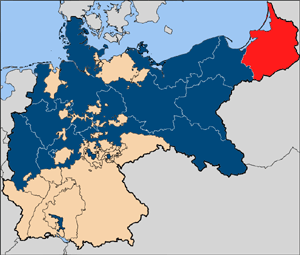 |
In the
remote duchy of (East) Prussia the Reformation passed through more violent
vicissitudes. In 1549 Duke Albert had brought his favorite teacher, Osiander (Andreas Hosemann), into
his secularized duchy, where, in defiance of the orthodox Lutheranism of his
subjects and of the University of Königsberg in
particular, this theologian expounded his mystic deviations from the cardinal
dogma of justification by faith. The resistance to these innovations, combined
with the bitter jealousy of the Prussian nobility against the ducal government,
caused a popular agitation to be savagely stirred up; and the Osiandrists were excluded from the Sacraments. After Osiander's death in 1552 a still stronger hatred
accumulated itself against his associate Johann Funck,
the ducal confessor, who with his camarilla was believed to control the Duke
and his Duchess, with the aid of her treasurer, a charlatan named Skalich. Funck, who had caused
the removal of the exorcising passages from the baptismal service, was charged
with Calvinism; and the nobility once more took advantage of the fanatical
excitement of the people. In October, 1566, Funck,
amidst popular rejoicings, suffered the penalty of death in the market-place at Königsberg; a strict Lutheran formula of belief was
promulgated as binding upon all holders of offices, whether temporal or
spiritual, in the duchy, and the privileges of the nobility were reconfirmed.
The episode, one of the earliest to mark the depth of the fissures in German
Protestantism, went to the heart of the Prince who had introduced the
Reformation into Prussia; and there was some color for the fiction that he died
a Catholic (1568).
The
territorial power of the Elector Palatine was inferior to that of the Elector
of Saxony, and even more to that of the Elector of Brandenburg, although he
enjoyed precedence over both. But the aspirations of the rulers of the western
border-State already took a far wider range than those of their fellow
Electors. The Reformation had been definitely introduced into the Palatinate by
the Elector Otto Henry (1556-9); but this Prince, memorable for his scholarly
and artistic interests and achievements, steadily adhered to the Augsburg
Confession in its original form. It was not till with his death the Electorate
passed to the Siminem line that its rulers began to
identify themselves with advanced and militant Protestantism. Otto Henry had
for the sake of his cherished University of Heidelberg cultivated relations
with Switzerland and France, and had lent an ear to the proposals of his near
neighbor, Duke Christopher of Württemberg, for the formation of a Union of the
Protestant Estates.
Château de Chambord, Chambord, France. People who lived in such a hut what could think of themselves but having divine rights? |
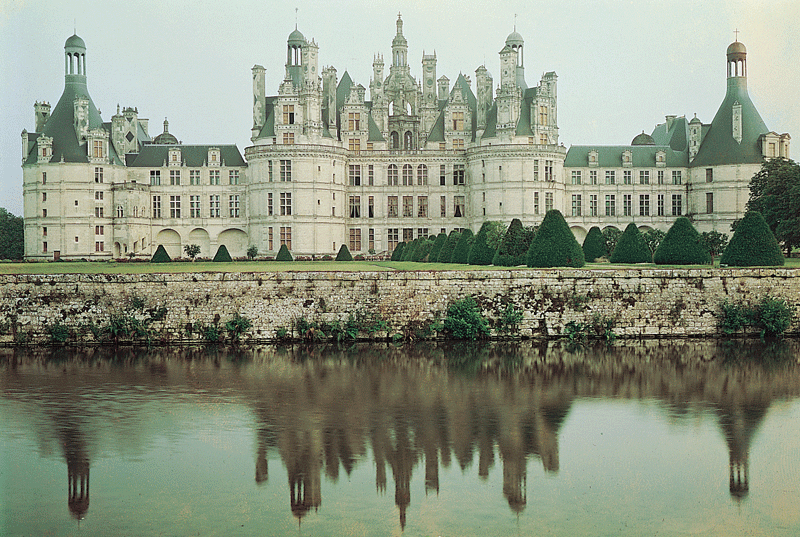 |
A wholly new
life was brought both into the internal government of the Palatinate and into
its foreign relations by Frederick III (1559-76), whose mind was in a gross age stedfastly set on spiritual things. After beginning
with the reform of the administrative system of the Palatinate he proceeded to
the work of the establishment of Calvinism, which may be said to have been
accomplished by 1564. In this year the Ecclesiastical Council, consisting of
three clerical and three lay members, was set up as the chief authority of the
Palatinate Church; and under it the Presbyteries began to administer the
ecclesiastical discipline of the land. Often, no doubt, they displayed a spirit
of intolerance that was vainly resisted by a high-minded member of the Council,
Thomas Erastus (Lieber). In the same year, 1564, was
promulgated the so-called Heidelberg Catechism, of which the joint authors were Olevian, a native of Trier, brought up in France, and Ursinus (Beer), a pupil of Melanchthon. In this
document the doctrine of the Eucharist was distinctly formulated in the spirit
of pure Calvinism. This open establishment of a form of belief and worship
abhorred by both Catholics and Lutherans called forth a formidable array of
adversaries. A pertinacious resistance to these religious innovations was
offered in the Upper Palatinate, where the autonomous pretensions of the
nobility and towns cooperated with the convinced Lutheranism of the governor,
the Electoral Prince Lewis. The Lutheran Princes in the vicinity of the
Palatinate raised an angry protest; and Pope Pius IV pressed upon the Emperor
the necessity of active measures against this sectarian reform. But Frederick
III stood firm, adhering with immovable fidelity to his position. Compromise in
any direction was impossible to his nature; the Catholics in the Palatinate
were only tolerated so long as they refrained from the public exercise of their
religion. But he permitted no deviation into heresies outside his symbol; and
an Arian movement which arose in the Palatinate was with his approval
ruthlessly repressed.
| Frederick III (1559-76) |
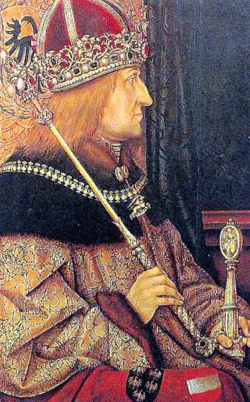 |
In
accordance with the spirit of the Calvinistic Reformation of Frederick III,
perhaps also with the impersonal character of the Palatine government in this
new stage of its history, he paid comparatively little attention to the
augmentation of the territorial power of his dynasty. The sees around were in any case too firmly in Catholic hands to be within reach of
princely ambition. The convents, however, hitherto under the control of these
sees, and very numerous here on both sides of the Rhine, were unsparingly
appropriated; but their revenues were mainly devoted to the purposes of Church
and schools.
The
religious isolation of the Palatinate, together with the positive spirit of a
religious propaganda which animated the Elector and his councillors,
made it inevitable that they should be intent upon the formation of foreign
alliances. So early as 1562 Frederick III had offered a new home at Frankenthal to sixty refugee Calvinist families from the
Netherlands; in the same year Condé is found in active correspondence with the
Elector. The way was already opening before the Palatine House which was to
divert it further and further from its allegiance to a Catholic Emperor.
The three
Spiritual Electors in Ferdinand's reign could hardly be said to hold the
balance against the three Protestants among the Temporal. Though none of them
had as yet thought of defection from the Church of Rome, only one of their
number--the least important in power or authority--strenuously upheld her
interests. This was the Elector of Trier, Archbishop John von der Leyen (1556-67), who in 1559
had to quit his capital, where, in consequence chiefly of the teaching of Olevian, the followers of the Reformation were in the ascendant.
Though he soon made his way back by force, and hereupon with Jesuit help (for Canisius had in 1565-6 appeared in these parts to urge the
execution of the Tridentine decrees) imposed a
Counter-reformation upon his subjects, it was only under his successor,
Archbishop Jakob von Eltz (1567-81), that the old order of things was restored.
The
Elector of Mainz, Archbishop Daniel Brendel von
Homburg (1555-82), only gradually made head against the influences adverse to
Rome by which he found himself surrounded both at his Court and in his Chapter.
In time he too made effective use of the aid of the Jesuits, whom he
established in colleges both at Mainz and at Heiligenstadt;
but the general bent of his policy was not aggressive, and he might be reckoned
as of the middle party in the Empire.
Finally,
Count Anton von Schauenburg (1556-8) and Count Gebhard von Mansfeld (1558-62),
who in succession held the archbishopric and electorate of Cologne, were with
more or less of reason supposed actually to incline to Lutheranism. Gebhard's successor Count Frederick von Wied (1562-7), a member of the family to which the former Archbishop Hermann had
belonged, openly refused acceptance of the Tridentine decrees; and the papal confirmation was in consequence refused to him. His
broken fortunes and shattered health, in combination with his impotence as a
ruler, led to his resignation (1567). His place was taken by Count Salentin von Isenburg, whose more
vigorous but pacific rule was ten years later to have a similar ending.
While the
Electors were thus divided in opinions and sympathies, although the prevailing
tendency in their lands was almost uniformly towards Protestantism, except
where its advance was arrested by a reactionary propaganda, such was even more
notably the case in the dominions of the Princes of the Empire. In the whole of
northern Germany, indeed, only one princely House had a Catholic head. But the
Catholicism of Ferdinand's son-in-law Duke William (1539-92), who united in his
hands the inheritances of Cleves, Mark, Ravensberg,
Berg, and Jülich, remained of a singularly tempered, eirenic type, until in the latter part of Maximilian's
reign the collapse of the Duke's mental powers combined with the progress of
the conflict in the Netherlands to favor an almost complete Catholic reaction.
Provinces of Jülich-Cleves |
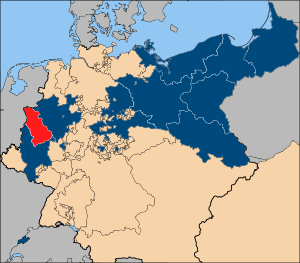 |
Thus at
all events the outward cohesion was not broken among the States composing that
great Catholic group which in the north-west of the Empire occupied a position
of so much significance for both its religious and its political future.
Besides the Jülich-Cleves duchies this group of
territories comprised the three spiritual Electorates, and the Imperial towns
of Aachen and Cologne, the solitary examples of their class which remained
altogether Catholic-although in the former a violent expurgation of town
council and municipal offices had to be effected so early as 1560-together with
the Westphalian sees of Münster, Osnabrück and Paderborn (united under one Bishop from
1566 to 1574), and the Rhenish sees of Worms and Speier.
With the
exception of Jülich-Cleves the princely Houses of
northern Germany were either entirely or mainly Lutheran. Of the four principal
lines into which the House of Brunswick-Luneburg were divided, two were
Protestant and two Catholic; but one of the latter was on the eve of
extinction, and in the other, the Brunswick-Wolfenbüttel line, violently hostile to the Reformation, a change accompanied the accession
of Duke Julius, in 1568. His son, the Emperor Rudolf's faithful adherent, Duke
Henry Julius, was a typical later example of Lutheran Imperialism; and even the
Catholic Duke Henry the younger had been obliged to grant to his subjects the
communion sub utràque. He had lived long enough to
help to establish Bishop Burchard von Oberberg in the diminished see of Hildesheim, which, after
being for a few years subject to the unconsecrated sway of Duke Frederick of
Holstein, now (1557-73) stood out as the solitary really Catholic see in
northern Germany, but was administered on tolerant principles. Between the
Houses of Brunswick-Luneburg, Saxe-Lauenburg, and
Holstein, of which last the elder branch was represented on the Danish throne
by King Frederick II, the great northern archbishopric of Bremen, and the
neighboring bishoprics of Verden and Lübeck, could not but forfeit their ecclesiastical
independence. Under Archbishop George, the Catholic Duke Henry of Brunswick's
brother, who was also Bishop of Verden and Minden,
Bremen and the adjoining sees were all but wholly Protestantized;
and, after his death in 1566, Bremen (and in 1574 Paderborn and Osnabrück) passed into the hands of Henry of Saxe-Lauenburg, who, though a trimmer, professed adherence to
the Augsburg Confession. The Lübeck Chapter, though
still Catholic, in 1561 accepted Frederick II's nomination of a virtually
Protestant Bishop. So, again, the Dukes of Mecklenburg to all intents and
purposes secularized as well as Protestantized the sees of Schwerin and Ratzeburg,
and the Pomeranian Dukes that of Cammin.
Mecklenburg-Schwerin |
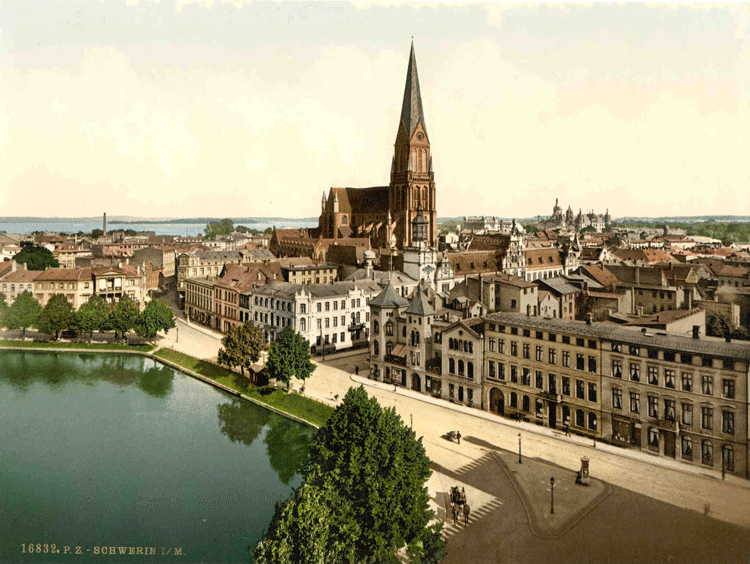 |
Charles V |
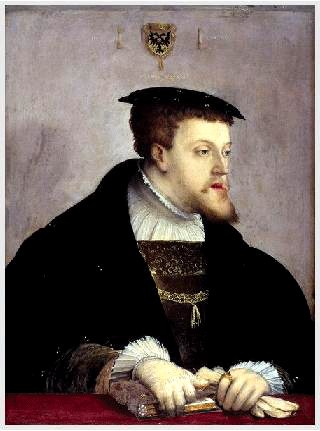 |
In the
border-lands of northern and southern Germany the most important princely House
was the Hessian, of which old Landgrave Philip remained the head till his death
in 1567, nearly twenty years after he had become the prisoner of Charles V. He
was indisputably the most far-sighted of the German Protestant Princes of the
Reformation age, and the real originator of the aggressive policy based on the
use of opportunities arising outside the Empire. But the time had not arrived
for realizing the conception of a wide Protestant alliance of the Princes of
western Germany with France and England, which his indomitable spirit formed in
the last years of his life, and towards which, at the close of Ferdinand's
reign, he actually took preliminary steps. The fourfold partition of his
territories, ordered by him in his last will, was to exemplify the disastrous
dynastic effects of the old Germanic system of subdivision; but his spirit was
to survive in the eldest, or Cassel, line of the Hessian Landgraves. In the matter
of the exercise of religion Philip, to whose private faults his public
greatness may make us a little blind, showed a large-minded, and at the same
time politic, tolerance, which recalls that of William the Silent. The head of
the German branch of the House of Nassau, Duke John of Nassau-Dillenburg, though not himself inclining to the tenets of
the Calvinists, regarded them as an organic portion of the Protestant body, and
from an early date (1566) identified himself with the movement in the
Netherlands headed by his brothers William and Lewis. The actual establishment
of Calvinism in Hesse-Cassel belongs to a later date
(1605).
In the
immediate neighborhood of the dominions of the bellicose Landgrave of Hesse lay those of the Prince Abbots of Fulda, who took
precedence over all other Abbots in the Empire, and who through eight centuries
had continued to increase their wealth and maintain a high position among its
Princes. But even they had not been able to resist the current of religious
change, and under six Abbots who followed on one another in more or less rapid
succession (1529-70) Protestantism spread without much let or hindrance. It was
not till 1573 that, as we shall see, the Counter-reformation found an anchorage
in Fulda.
In the
German south the balance of strength between the religious parties in this
period was by no means so decided as it was in the north, though here also,
besides the House of Austria, only a single dynasty consistently adhered to the
Church of Rome. In the south-west lay the large majority of the Imperial towns,
nearly all more or less Protestant-even at Augsburg the Catholics were in a
minority-and necessarily forming points to which a Protestant propaganda could
most easily attach itself. Of the immediate nobility, too, whose
representatives sat on the four Counts' benches in the Diet, the Swabian and Franconian Counts,
and those of the Wetterau (north of Frankfort), were,
like the Knights, mainly Protestant; though their interests were directly
opposed to the territorial aggrandizement of the Princes. The great bishoprics
of the south-Würzburg, Ratisbon, Passau, Salzburg-might seem so many fastnesses
of the Catholic Church; and even in the case of Strasburg, while the Imperial
city, after joining in the full flood of the Protestant advance, had, in 1532,
formally adopted the Augsburg Confession, the Bishops of the diocese had
steadfastly maintained their allegiance to Rome. Bishop Erasmus, a Count of Linburg (1541-68), who did honor to his name by the moderation
of his conduct both at Trent and at home in his see, was, however, no better
able to secure the continuance of Catholic worship, either in the city at large
or in its minster, than was his successor, Count John zu Manderscheid, by means of his more vigorous rule.
|
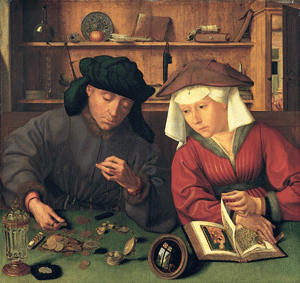 |
It was
inevitable that Catholicism should fare no better in the Swabian towns, among which Ulm as usual took the lead, although their oligarchical councils were in sympathy with the old order
of things. For Duke Christopher of Württemberg (1550-68) whose territorial
power pressed upon them, was--after his neighbor, the Elector Palatine--the
foremost among the Protestant Princes of the west and south. The abnormally numerous
convents within his territories, especially the fourteen great abbacies, were
"reformed" in 1556, their revenues being seized by his government;
but, as the constitution of Württemberg gave the controlling power over its
finances to the Estates, these revenues were managed by committees practically
representing the Lutheran clergy and the towns, and were appropriated by them
to educational purposes, above all to those of the University of Tübingen. Thus the Protestant Church, which in 1565 the
Württemberg Diet declared the sole Church of the land, was here, even more
decisively than in the Palatinate, established on a broad basis of stability.
Unfortunately, however, on the question of dogma the Palatinate and Württemberg
soon found themselves widely asunder; for Duke Christopher, a Prince of high
character and ability, was a rigid Lutheran, and at one time advocated the
exclusion of his Calvinist neighbor from the benefits of the Religious Peace.
This strong dogmatic difference seems not to have remained without influence
upon his relations with foreign Powers and parties--with France in
particular--which for the most part were far more pacific, in their tendency
than those of the Palatinate government.
Duke Albert V of Bavaria(1550-79), portait by Hans Mielich |
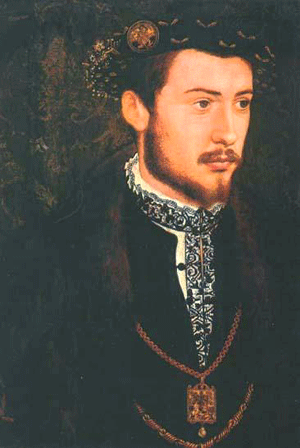 |
While to
the west of Christopher's dominions lay those of the Elector Palatine and of
the Baden Margraves, in whose Protestant partisanship the Counter-reformation
had not yet made a breach, his eastern neighbor was the Prince whose House was
under him first to become the mainstay of Catholicism in southern Germany. Duke
Albert V of Bavaria (1550-79) united in his hands the whole of the dominions of
both the Bavarian lines (Munich and Landshut); and his long reign, during the
whole of which he had by his side his consort Anna, daughter of the Emperor
Ferdinand, was marked by unbroken vigor of purpose and conduct. No contemporary
sovereign showed a stronger determination than he of putting into practice the
principle of the Religious Peace, that each territorial Prince should direct
and control the religious faith of his subjects and its exercise. A spirit of
revolt against the existing Church had first shown itself at the Landshut Diet
in 1553, when the nobility put in the forefront a complaint as to the
disciplinary and moral decadence of the clergy. At the Munich Diet in 1556 the
temporal Estates decisively combined with this grievance positive demands for
the concession of the Cup in the Sacrament, and the relaxation of the
obligations of fasting. The Duke had to give way on these latter points, though
maintaining the Catholic use at his Court; but with regard to the general
condition of the clergy and its ministrations an anarchy ensued almost as
intolerable as that prevailing on the other side of the Austrian frontier. It
is noticeable that to this period belongs the conclusion of the so-called Landsberg League between the Emperor Ferdinand and the
neighboring Catholic potentates of Bavaria, Salzburg, and Augsburg (June,
1558). The Bavarian nobility continued their demands (which included the right
of marriage for priests) at the Ingolstadt Diet of 1563; and soon afterwards
(April, 1564) the papal brief arrived which here, as elsewhere, under certain
conditions permitted communion in both kinds to the laity. But Duke Albert had
already entered upon his twofold policy, of resisting the further advance of
Protestantism in his dominions, and seeking to reform their religious condition
in the spirit of the Council of Trent, where his own ambassador Baumgartner had
(June, 1562), while urging the concessions demanded by his Duke, given a
notable impulse to the effort for an inner regeneration of the Church. The
opposition to his ecclesiastical policy among the Bavarian nobility, and at the
same time the chronic resistance to it in the Diets, were permanently broken by
his vigorous action in the case of the so-called "Ortenburg conspiracy". Count Joachim von Ortenburg had
openly introduced the Reformed worship into his possessions, part of which were
asserted by him to be immediate to the Empire, when Duke Albert by a
coup-de-main (early in 1564) occupied two of Ortenburg's castles, deported two of the Protestant clergy brought by him into the countship, and confiscated his Bavarian estates. The nobles
who had been associated with Ortenburg--though there
is no evidence either of his having aimed at supplanting the Duke, or of their
having entered into negotiations with foreign Powers--were subjected to a six
weeks' imprisonment, terrified into submission, and in part forbidden further
attendance upon Diets. Though Count von Ortenburg's claims to immediacy and in consequence his right of determining the religion of
his subjects was after a suit of nine years' duration allowed by the Reichskammergerwht-Ortenburg is said to remain a kind of
Protestant enclave to the present day-Duke Albert's highhanded action had
answered its purpose, and he was able to carry out unhindered his endeavors for
the Catholic reformation of his duchy. In this policy dynastic motives may have
cooperated; for the election in 1565 of his son Ernest, the occupant of a
plurality of canonries, to the bishopric of Freisingen opened an episcopal career in the course of which the sees of Hildesheim, Liege, and Cologne were
successively secured by that Prince.
|
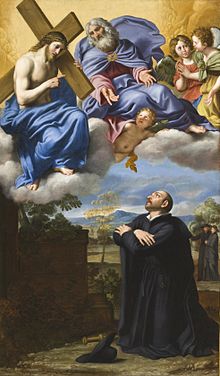 |
The
exceptional success of the Catholic reformation in Bavaria--which within the
first four years was such that Albert boasted to have brought back 10,000 of
his subjects to their religious allegiance--is primarily explained by the fact
that here Protestantism had not as yet, as it had in most other parts of
Germany, become master of the situation. But it was also largely due to the
direct intervention of the ducal authority, which asserted itself so systematically
as to alarm ecclesiastical susceptibilities. The government instituted
visitations both of priests and people; expelling recalcitrants,
regularly inspecting the clergy, holding examinations for candidates for
orders, and reorganizing the whole system of primary and secondary schools. The
chief combatants in the struggle were, not the native clergy, to a large extent
unmannered and unlearned, and distinguishable from the peasantry chiefly by
their greater licence of life, but the resolute and
devoted external agency which had here early taken in hand what it regarded as
its proper work. The Jesuits had made their entry into Bavaria so early as
1542, at the invitation of Duke William IV, in the person of Ignatius Loyola's
companions Lefèvre and Le Jay; and in 1549 the
latter, with Salmeron and Canisius,
opened courses of lectures in Ingolstadt. The enterprise was resumed in 1556,
when a Jesuit College was established in the same town, and brought into an
organic connection with the University. The Order had now a firm footing, and
gradually established itself at Munich and elsewhere in Bavaria, as well as at Dillingen, the University of the Archbishopric of Augsburg. Canisius, Lancius, the
first rector of the Munich Gymnasium, and above all, Paul Hoffraeus,
who in 1568 succeeded Canisius as Provincial of the
Upper German Province of the Order, by their personal influence over Duke
Albert helped to give completeness to his Counter-reformation; together with
the learned convert Staphylus (Stapellage)
of Osnabrück, who had been a pupil of Luther and
Melanchthon, but had afterwards done yeoman's service at Trent. This
Counter-reformation addressed itself to the intellectual life of the population
at large by the spread of orthodox publications and the exercise of a severe
censorship over such as seemed dangerous, including many books and tracts on a
favorite theme of contemporary Protestant writers--the devil and his processes;
but the movement failed to effect a radical change in the ordinary character of
the Bavarian priesthood.
The
Cardinal Bishop of Augsburg, Otto Truchsess von Waldburg (1534-73), a prelate who enjoyed the confidence of
a succession of Popes and of the Emperors Ferdinand and Maximilian, had been
from the first thoroughly at one with the Bavarian House in his resistance to
the Protestant advance, and had long protested against the Religious Peace. It
was he who made over to the Jesuits the institutions which he had founded in
his archiépiscopal capital of Dillingen-university,
seminary, and gymnasium. Dillingen, from 1564
onwards, became a kind of second Collegium Germanicum as a training place for the Jesuit mission. Into
Würzburg also the Jesuits were introduced in 1566 by Bishop Frederick von Wirsberg, the successor of Grumbach's victim (1558-73); and even to Ratisbon, after previous Bishops had been unable
to prevent the spread of Protestantism in their diocese, the Jesuits found
their way in 1587, under the sway of Bishop Philip, grandson of Albert V, and
afterwards Cardinal. Finally, in the great Archiépiscopal see of Salzburg, where an elder Bavarian Ernest, uncle to Duke Albert V, and
previously Bishop of Passau, had at a quite early date introduced the Jesuits
Faber and Lainez, the Archbishop's wholesale
expulsion of Protestant families from his see led to the intervention of King
Ferdinand, and finally to Ernest's resignation (1554). But the same troubles
continued under his successors, Archbishops Michael von Kuenburg and Johann Jacob Kuen von Belasi,
the latter of whom refused to allow the papal concession of the Cup to the
laity to take effect in his diocese (1564). A further forced emigration of
Protestant families followed, while their children were detained, to be brought
up in the Catholic faith. These persecutions reached their height in the reign
of Rudolf II.
The above
rapid, and necessarily incomplete, survey will have indicated what main forces
will be found in action and counter-action during the period of jealousy and
imminent conflict between the religious parties of which the chief vicissitudes
have now to be summarized. To the still continuing expansion of Protestant
beliefs and forms of worship among the populations at large, and to the
appetite of the Protestant dynasties for the absorption of ecclesiastical lands
and revenues, Catholicism was beginning to oppose an active endeavor to reform
the Church and its clergy in accordance with the decrees of the Council of
Trent, and to bring the life of the people into harmony with this organic
regeneration. The aggressive force of Protestantism was far from having
exhausted itself in the Empire; and signs were not wanting of its entering into
new and wider fields of action. But it was arrested by the determined refusal
of some of the foremost Lutheran Princes to subordinate to the advancement of
their form of faith dynastic interests which they regarded as bound up with a
loyal adhesion to the Emperor and the maintenance of the established
institutions of the Empire. It was moreover weakened in itself by the internal
divisions among the Lutherans, due to a hardening and stiffening of dogmatic
systems for which the idiosyncrasies of particular religious teachers and the
arbitrary decision of the Princes were primarily accountable; and above all by
the unwillingness of the Lutheran potentates to admit the Calvinists to a share
in the privileges of parity which had been secured to themselves by the
Religious Peace. In these circumstances an effective joint action among the
Protestant Estates seemed as yet out of the question, while the experiment of
foreign alliances was only beginning to suggest itself to the more enterprising
or far-sighted of their number.
Porch of Ratisbona Cathedral, by Samuel Prout |
 |
Threatened
treaties, like threatened men, sometimes live long; and even the most obnoxious
stipulation connected with the Religious Peace of Augsburg, the reservation ecclesiasticum, was to survive the first trumpet-blast of
Protestant wrath. The Diet of Ratisbon (1556-7), summoned by Ferdinand in the
first instance for the grant of aid against the Turks, and in the second for
giving to the Religious Peace what completeness it might still lack, was at
once used by the more eager among the Protestant Estates for an attempt to
remove the detested provision. But Augustus of Saxony had no intention of
seconding the Palatine policy of making the Turkish grant conditional upon the
acceptance of Württemberg' proposal for the abolition of the reservation. An
aid was granted larger than the Palatines and smaller than Saxony would have
preferred; and the religious question was left over for the not very hopeful
occasion of a religious colloquy. Such a colloquy was actually opened at Worms
a few months later (September, 1557); but it broke down in consequence of a
protest against heresies delivered by the Ernestine theologians, with Flacius at their head, which Melanchthon, who was also
present in person, knew to be directed against himself. The Flacian position, which demonstrated the fallacy of Melanchthon's hopeful declaration
that no difference existed as to the Augsburg Confession among its adherents
was restated in the Confutatians buch,
published early in 1559, and at first set up as a kind of symbol at Jena. This outburst
justified Canisius, who also attended at Worms,
having in 1557 become Provincial of Southern Germany, in demonstrating the
futility of a settlement; and the colloquy came to an abrupt end.
At the
Diet of Augsburg in 1559 the situation was very much what it had been at
Ratisbon. The Protestant ambassadors met, as before, for separate consultation
under Palatine leadership, the instructions of the presidents during part of
the proceedings being supplied by the new Elector Frederick III. The attempt to
postpone the Turkish aid till the religious grievances should have found
redress was again made, and again defeated; and the treatment of the religious
difficulty was put off to a more convenient season. The reopening of the
Council of Trent was at hand; and, while under the exhortations of Canisius the Catholic Bishops prepared to meet its
reforming decrees half-way, Ferdinand would fain have induced the Protestant
Princes to be represented there. But of this there was no chance; and Germany
had no part in the reforms promulgated by the Council.
The
Protestant Princes in the meantime continued to apply their territorial policy
to the ecclesiastical foundations within their reach; and the despoiled conventual bodies found it impossible to obtain redress
from the Kammergerickt. On the other hand, the
Catholics successfully asserted their power in the towns within their sphere of
influence; at Trier, as has been seen, the Archbishop-Elector recatholicised his conquered capital; and in the Imperial
city of Aachen, whose vicinity to the Netherlands frontier had led to the
intervention of an Imperial commission, the town council and all civic offices
were declared open to Catholics only, while many Protestant immigrants were
expelled from the place (March-May, 1560).
|
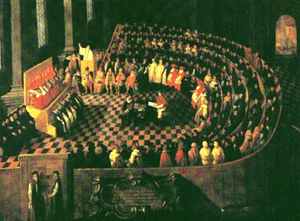 |
Before
the Council of Trent was declared once more in session, the expediency of
presenting something like a united front seems to have impressed itself so
strongly upon the Protestant Princes that even Augustus of Saxony was found
ready to take part in a meeting at Naumburg (January,
1561), where, though Melanchthon was now dead, an attempt was made to secure a
doctrinal agreement on the basis of the 1540 edition of the Augsburg
Confession. But the effort was frustrated by the zeal of the Ernestine John
Frederick; and, instead of a welcome being accorded to the ideas of union
advanced by Philip of Hesse, this failure led to a
wider severance than before between Lutherans and Calvinists. The strict
Lutherans of the Lower Saxon Circle at Lüneburg reaffirmed their opposition to Calvinism (August, 1561); and three years later
Frederick III of the Palatinate put forth the Heidelberg Catechism, which
proclaimed the breach as permanent.
It is
needless to dwell here on the general significance for the Empire and its
subsequent ecclesiastical life of the last and decisive period of the Council
of Trent, of the decrees on reformation which supplied a definite basis for the
administrative practice of the Church of Rome, and of the machinery by means of
which, as applied more especially to clerical discipline and to the education
of the young, that Church, with an ardor augmented by success, strove to
recover the ground which she had lost. In response to the demands of Ferdinand
I the question of the use of the Cup by the laity had alone been reserved for
the papal decision, and after minute enquiry and on specified conditions was
favorably determined by a simultaneous series of briefs to the German
Archbishops (April, 1564). The Emperor had withdrawn the proposal for a
relaxation of the observance of fasts, while that for permitting the marriage
of clergymen had been answered by a Conciliar anathema. Ferdinand had regarded this concession, together with that of the
Cup, as offering the only prospect of preventing the further disintegration of
the Church in his own and the adjoining lands; and he knew that in regard to
the marriage of priests practice could not at present be accommodated to
precept. Although, therefore, Canisius, whose counsel
in religious matters he had long so willingly followed, had at Trent
uncompromisingly opposed all concession, Ferdinand seems to the last to have
clung to a policy of conciliation. As late as the summer of 1564--not many
weeks before his death--he consulted George Cassander,
a Flemish scholar of wide training and open mind, whose pacific treatise on
points of controversy between Catholics and Protestants, undertaken at
Ferdinand's request, was completed by the wish of Maximilian II, and in due
course found its place in the Index.
| William of Orange (1533-1584) |
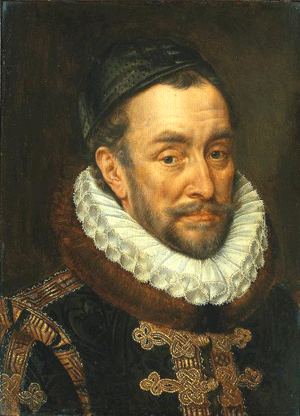 |
Meanwhile,
as the Emperor Ferdinand's life drew towards its close, and within the Empire
and in his own dominions the elements of disturbance seemed to increase, the
conflict had broken out beyond the borders of the Empire, into which, if
religious differences continued to divide it into opposing camps, some at least
of its members could not in the end fail to be drawn by sympathy or interest.
In the Low Countries the thunder-clouds had not yet broken; but the religious
situation created by the Inquisition had become intolerable; and already the
fugitives for conscience' sake, a large proportion of whom found their way into
Germany, were to be numbered by thousands. When William of Orange appeared at
Frankfort in 1562, on the occasion of the election of Maximilian as Roman King,
he counseled the Protestant Princes to be mindful of the Netherlands, and to
seek to allay the contentions between the Protestant Scandinavian Powers. In
France the First Religious War actually opened in 1562; and in April of that
year a Huguenot embassy visited the Courts of the more resolute among the
German Protestant Princes, the Elector Palatine, the Dukes of Württemberg and
of Zweibrücken, and the Landgrave of Hesse, money aid was given by some of them and by the
Margrave Charles of Baden, and in Hesse recruitings actually began. On the other hand Augustus of
Saxony, when the Huguenot overtures reached him in his turn, was clear for
non-intervention in a foreign quarrel. The Emperor, though he had always kept
up a friendly understanding with his nephew Philip II, and showed little
disposition to enter into closer relations with the fluctuating government of
France, was on the whole, as he had ever been, anxious for the preservation of
peace abroad as well as at home. But the prospect of a wider Protestant
combination, in which Estates of the Empire would be united with foreign
allies, was no longer remote; and how this contingency would affect the Empire
was one of the most important of the problems of which the solution must needs
largely depend upon Ferdinand's successor.
The
choice of that successor was determined by the election of the Emperor's eldest
son, Maximilian, as Roman King on November 28, 1562. We have seen that he was
crowned King of Hungary in the following year, and that in Bohemia he had been
acknowledged as successor at so early a date as 1549. It is true that by his
last will Ferdinand, moved by parental feeling, assigned to his second son,
Archduke Ferdinand, together with Anterior Austria, the countship of the Tyrol; while to his youngest son, Archduke Charles, who was a suitor for
the hand of Queen Elizabeth, he left the duchies of Styria, Carinthia, and
Carniola, with the countship of Görz.
But Upper and Lower Austria remained to Maximilian, and due provision was made
both for his supreme control in the matter of wars and alliances, and for the
security of the succession in all its hereditary dominions of the male line of
the Austrian Habsburgs. The solidarity of the power of the dynasty was thus
assured.
Maximilian II and his family |
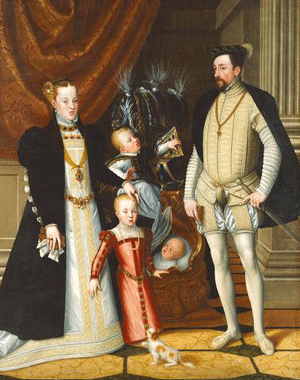 |
Maximilian
II, like his great-grandfather and namesake, was not actually brought face to
face with the national and European crisis which already during his reign
seemed imminent. Nevertheless, his personal relation to the conditions of the
conflict that was preparing and announcing itself is of signal importance, and
makes it necessary to go back for a moment on his previous history. Like the
earlier Maximilian, he was not a great man; but he was gifted with some of
those qualities which justly bring an exceptional popularity to Princes
possessed of them. Certain of the happiest features of his
nationality--open-mindedness and a kindly humor were united in him with equally
marked characteristics of the age in which he lived. Unlike both his father and
his uncle, he was enabled by his impressionable and flexible nature and by his
varied training to accommodate himself to the manners and ways of many nations,
and to exhibit an appreciative interest in divers intellectual currents of his
times. His genuine sympathy with the religious movement that in the days of his
youth had taken so strong a hold of the lands over which he was destined to
rule was patent to the world, and riveted the attention of all whose hopes or
fears centered in that movement. But he was also, after the fashion of his age,
a student of science; and the fashion of his age was observation and
experiment, all too frequently degenerating into sciolism and quackery. But Maximilian seems to have loved research for its own sake, and
both science and art (botany and music in particular) as refining and
brightening life. At the same time he possessed what to a sovereign is worth
nearly all other qualities and accomplishments--the gift of a spontaneous and
never-failing courtesy, which made foreign Princes and their envoys pronounce
him the most perfect cavalier in existence, while he had an opportune
recollection and a kindly word for the humblest attendant at his Court. But the
skeptical disposition of his mind affected, and no doubt weakened, the power of
moral decision, which few men have been called upon to exercise in
circumstances of greater gravity.
Born on
July 31, 1527, Maximilian was the junior by ten weeks of his Spanish cousin.
From the first, Philip's succession to the Spanish monarchy and Maximilian's to
the Austrian lands transferred to his father by the Emperor Charles V had been
regarded as settled. But, when in 1547 Charles consented to a marriage between
his elder daughter, Maria, and her cousin Maximilian--it was actually celebrated
in the following year--the hoped-for dowry of Milan or (what would have suited
him better still) the Low Countries, was withheld. There is no evidence that at
the time of the marriage either Charles V or Ferdinand suspected Maximilian of
any inclination towards Lutheranism, such as is supposed to have been instilled
in him as a boy or youth by a teacher named Schifer (Severus). During his two years' sojourn in Spain, where he and his wife in
Philip's absence conducted the government, the great number of reports received
by Ferdinand as to his son's more or less satisfactory observance of his
religious duties may possibly point to some special anxiety on the subject. He
was recalled from Spain by the Emperor towards the close of 1550 in order to
take part in the deliberations which ended in the Family Compact of March 9,
1551, according to which Philip was to succeed Ferdinand on the Imperial
throne--Maximilian administering German affairs as Roman King under his cousin.
Ferdinand's consent had been most reluctantly given; and Maximilian, whose
prospects were so injuriously affected by the Compact, was at once courted by
Maurice of Saxony and by Henry II of France. When the crisis came, Maximilian
as well as his father proved true to Charles V; but the collapse of the
Imperial and Catholic cause was in part due to the unpopularity of the Spanish
scheme in Germany, and perhaps to the inevitable coldness between the two
branches of the House of Habsburg. In 1552, when, on his way to a Turkish
campaign in Hungary, Maximilian fell ill, sinister suspicions were entertained
by him of poison administered in the Spanish interest.
Mary I of England (Bloody Mary) painted in 1554 by Antonius Mor. Museum of Prado, Madrid. |
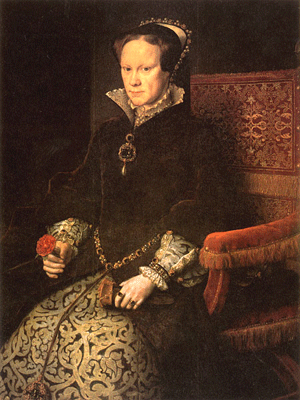 |
Cordial
relations were not established between the German and Spanish lines till, as
was shown by Philip's marriage with Mary of England (1552), the ambition of
Spain was directed to the establishment of her supremacy over the west of
Europe, and the Emperor definitively abandoned the project of securing the
Imperial succession to his son. Though Ferdinand was allowed to take his own
course in concluding the Religious Peace of Augsburg, his loyalty towards his
brother and his devotion to Rome remained alike undoubted. It was otherwise
with Maximilian. He showed himself-as for instance in the matter of his wife's
household-fully possessed by an antipathy against Spanish influence, which was
stimulated by his German courtiers and counselors. But unmistakable indications
now also began to appear that his religious views tended in the same direction.
Much as has been written on the subject, it is perhaps impossible to date the
beginnings of these symptoms; but it would seem to have been in the critical
year 1555 that the rumors as to his religious opinions first took anything like
a definite shape. They connect themselves, not with his jealousy of Spain, but
rather with the religious agitation in Austria which about this time had
reached a high point. There was in Austria an alarming lack of clergy capable
of edifying their congregations either as preachers or by their godly lives;
and Sebastian Phauser had been summoned to Vienna by
Ferdinand as one who would help to meet this need. Soon, however, the King
learnt that the preacher to whom he had listened with approbation was a married
man, and dismissed him. But when, about 1554, he learnt that Maximilian had
held discourse with Phauser, Ferdinand seems to have
raised no objection. In March, 1555, we know that Maximilian attended a church
where Phauser ministered according to forms and in a
spirit approaching at least very closely to Lutheranism. Soon afterwards, being
in charge of the government at Vienna during his father's absence at Augsburg,
Maximilian declined to approve the Jesuit suggestion that a declaration of
faith should be required from all ecclesiastics. Canisius hereupon denounced him and Phauser at Augsburg; and a
serious correspondence ensued between father and son, as well as communications
from the Emperor on the subject of his daughter, Maximilian's wife, with whose
strictly Catholic life Maximilian appears not to have interfered. Nor did he
absent himself altogether from Catholic services; but he preferred the
discourses of Phauser and the study of Protestant
writings, insisted on receiving the Sacrament in both kinds, corresponded with
Christopher of Württemberg, and even exchanged letters with Melanchthon.
Thus,
although, some vague menaces notwithstanding, there was neither in peace nor in
war-time any real fear of Maximilian's attempting to side with France against
Spain, his conversion to Protestantism seemed to become more and more likely.
Controversial argument having been tried in vain by the Spanish
"Magister" Gallo, the Archbishop of Toledo appeared on the scene to
advise on the treatment of the case, even, it was whispered, to prepare for the
divorce of Maximilian from his consort. After the death of Charles V
(September, 1558) Paul IV would have been prepared to push things to
extremities, had Philip II been ready to quarrel with his German kinsmen. The
accession of Pius IV (December, 1559) caused more prudent counsels to prevail;
but Ferdinand also had been alarmed, and in his last years never placed his
eldest son in a position of permanent power. In 1559 he again bade Maximilian
dismiss Phauser, but was answered by his son, that
rather than give way against his conscience he would surrender all his lands
and serve God in retirement. In 1560 the Electors of Saxony and Brandenburg
ventured to offend Ferdinand's pride by begging him to leave his son's religion
unmolested. The sorely tried Emperor (Archduke Charles had recently refused to
pledge himself on the subject of religion, should Queen Elizabeth listen to his
suit) resolved, with the aid of Maximilian's Spanish wife and her Spanish
confessor, to make one more attempt. We have Maximilian's own account of the
alternatives that were now placed before him--on the one side a greatness
which, if the life of the weakling Don Carlos were to be eliminated, might be
like the greatness of Charles V himself; on the other humiliation and
disinheritance.
Maximilian's
character was not equal to the test. He no longer insisted on retaining Phauser, but was content to find him a refuge at the Court
of Duke Christopher of Württemberg, whence he sent confidential messages to
other Protestant Princes. Augustus of Saxony declared himself ready to make
friendly representations to the Emperor, but advised Maximilian against active
resistance; and no distinct promise of aid seems to have reached Maximilian. He
accordingly now gave way outwardly, although there is no proof or probability
that any change took place in his religious opinions. Even early in 1561, when
the Protestant Princes were preparing for their meeting at Naumburg,
they for a time entertained the thought of inviting him to send a
representative there. But gradually his conformity with the Catholic Church
became undeniable. He occasionally attended mass, heard Catholic preachers, and
disputed, in varying moods, with zealous orthodox divines, including a
succession of three papal Nuncios--Hosius, Delfius,
Commendone. Except as to his consistent demand for the Sacrament in both
forms--and for this too he consented to ask as a favor from the Pope--he was
outwardly reconquered for the Church of Rome by his
father's firmness, seconded by the personal and other persuasions of Philip
II's ambassador, the Count di Luna, who seems to have
succeeded in extracting from Maximilian a kind of pledge of adherence to his
present line of submission.
Philip II (1527-1598) |
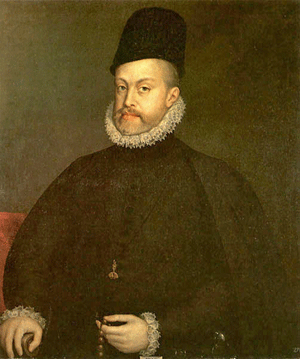 |
Such a
pledge was necessary, if the Catholic Electors were to be induced to vote for
the election of Maximilian as Roman King; and after having in the summer of
1561 asked the support of the hesitating Pope Pius IV for his election, in
February, 1562, he in the presence of the envoys of the Spiritual Electors at
Prague declared himself ready to remain a faithful member of the Church of
Rome. Yet there can at the same time be no doubt that the Protestant Electors
put faith in a promise made by him that when he sat on the Imperial throne he
would openly declare his acceptance of the Augsburg Confession; for, when
reminded of this undertaking after he had succeeded to the Empire, he only
pleaded the impossibility of carrying it out. There is accordingly every reason
for regarding the unanimous election of Maximilian as
Roman King (October 27, 1562) as the result of a double game. Maximilian's
subsequent conduct was so far consistent that henceforth he never really broke
away from the common policy of the House of Habsburg. It was in 1562 that
Philip II first informed his Austrian kinsfolk of the actual bodily and mental
condition of Don Carlos--a confidence which was not made in vain. Maximilian
not only gave his sons a Spanish education, but showed some assiduity on this
head; while Philip II, whose third wife had borne him no son, was on his side
desirous of maintaining the legitimate Habsburg succession in Spain. Dynastic
ambition thus counted for much in Maximilian's conduct as to religion. Yet his
intentions continued to remain suspected; nor was it till February, 1564, that
he was at last officially' recognized by the Pope in Consistory. The
recognition had not come too soon, for in the following July Ferdinand died.
Shortly after this event, the Venetian Ambassador Michèle gave it as his opinion that just as the Catholic Ferdinand had protected the
German Protestants in the enjoyment of the great concessions which he had made
to them, so Maximilian, notwithstanding his own inclinations, would seek to
preserve the remnants of the Catholic Church in the Empire. They were in truth
little more than the remnants; but (as in the case of James I in England) the
hopes of both sides ran high on the new Emperor's advent to the throne; and on
the whole his reign certainly proved advantageous to the progress of the
Catholic Reaction.
Solyman II (1642-91) |
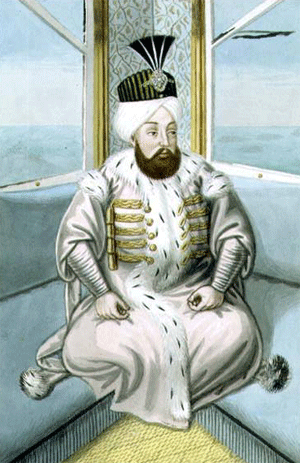 |
Maximilian’s
reign (1564-76), like that of his father, was overshadowed by the great Turkish
trouble and peril. We have seen how, two years before his death, Ferdinand had
concluded an eight years' truce with Solyman II, in whose hands he left a large
part of Hungary and to whom he consented to pay a tribute. Solyman, though
openly lamenting the death of so just an adversary as Ferdinand and protesting
his pacific tendencies to the new Emperor, continued the negotiations into
which he had entered with the young John Sigismund Zäpolya for establishing him in his father's stead as Voivod of Transylvania, in dependence on the Ottoman Power. Maximilian resented this
humiliating condition of things; and his commanders sought to anticipate the
Transylvanian in the occupation of fortified places. Soon, as has been related
elsewhere, the real adversary took the field. In June, 1566, Sultan Solyman II
was at Belgrade; and in August Szigeth fell after a
heroic defence. During the siege Solyman died in his tent; but, owing to
Maximilian's distrust of the report of the Sultan's death, the army of 100,000
which the Emperor had collected with so much effort, had done nothing to aid Zriny at Szigeth. A great aid,
amounting to some three-and-a-half million florins, had been granted at
Maximilian's first Diet; and his armada included contingents from Tuscany and
from Savoy; the Dukes of Mantua and Ferrara appeared at the head of their cavalry;
from France came the young Duke of Guise, eager to flesh his avenging sword;
there were knights from England, from Poland, and from Malta. But Maximilian
was without the genius for war which might have made him the victor by land of
an earlier Lepanto. In the next years his experienced general Schwendi gained some advantage on the Turks, but not enough
to secure from the new Sultan Selim II terms
substantially different from those granted by Solyman to Ferdinand. Moreover,
Maximilian’s army dissolved; the Bohemian and Moravian levies went home, and so
did Archduke Ferdinand. The frontier was settled on the uti possidetis basis, the Turkish limits
including Szigeth; and the Emperor continued to pay
tribute to the Sultan. Zâpolya remained in possession, but being dissatisfied
with his share concluded on his own account a secret treaty with Maximilian. On
his death in 1571 Stephen Báthory, with the Sultan's approval, took his place
as Prince of Transylvania. Even after Lepanto (October, 1571) Maximilian made
no attempt to resume the Turkish war; and on Selim II’s
death in 1574, when the Turkish inroads began to become frequent across the
Croatian frontier, the Emperor was glad to be able to obtain a renewal of peace
with his successor, Murad III. But Báthory's hostility to Austria caused the Transylvanian
difficulties to continue, and the Eastern peace remained a broken one.
Ivan the Terrible (1530-1584) |
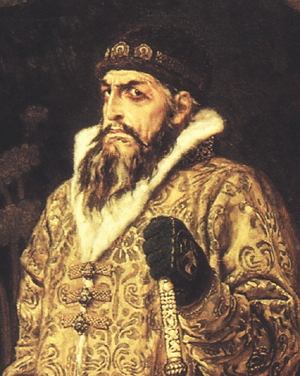 |
The
really ineradicable opposition between the interests of Austria and those of
the Turks contributed to give additional significance to the dynastic designs
of Maximilian on the Polish throne, which have likewise been described
elsewhere. On the death in 1572 of Sigismund Augustus, the last of the male
line of the Jagello Kings of Poland, Maximilian would
have gladly secured the election to the Polish throne of one of his sons,
Archduke Ernest, and thus gained an influence which would have sufficed to keep
Transylvania quiet; but Turkish advice and the fear of being drawn into the
chronic strife between Emperor and Sultan ensured the election of the Duke of
Anjou. After King Henry III of France had escaped from his Polish throne like a
thief in the night, the Polish Diet had, in 1575, to make another choice; and
this time, though once more the Porte intervened with a vigorous protest,
Maximilian himself was actually elected by one faction, the other choosing the
Transylvanian Voivod Stephen Báthory, The latter, as
has been seen was crowned King (1576), while Maximilian was perpending the terms, certainly far from attractive, offered him by his supporters. The
refusal of the Diet of the Empire to enter into Maximilian's Polish design
would have made it impossible for him, had he lived, to urge war against
Stephen Báthory for the Polish Crown. For the triple struggle which such a war
would have involved the only ally who offered himself was Tsar Ivan the
Terrible, himself a candidate for the Polish throne, who proposed a partition
of Poland and Lithuania with the Emperor.
It seemed
convenient to recall the Eastern pressure upon Maximilian's government, before
adverting to the progress of those internal difficulties in the dealing with
which that pressure could be ignored neither by the Emperor nor the Diet--the
ultimate resort as yet of contentions in the Empire. Though the Turkish danger
was after a fashion met by Maximilian's Diets, from his first in 1566 to his
last in 1576, it was impossible that the religious struggle and the conflict of
interests which intensified it should not injuriously affect the military
efficacy of the Empire as against the Turk; and, even had Maximilian displayed
capacity in the field, it would have been impossible for him, with the
inadequate resources of a disunited Empire, to drive back permanently the
Ottoman Power. But it was not only the Empire which was out of joint throughout
his reign; for the religious discord that was the main cause of its troubles
only reflected the conflicts which were now openly declaring themselves in its
western border-lands. Maximilian's accession to the throne occurred midway
between the outbreak of the French Religious Wars in 1562 and the first signals
of the Revolt of the Netherlands in 1567 and 1568. With the sympathies or
antipathies entertained in Germany towards the contending interests in these
struggles there cooperated the ineradicable inclination of the Germans towards
mercenary service in arms. In course of time a very considerable proportion of
the combatants in France and in the Netherlands came to be drawn from the
Empire. Now, while the right of an Estate of the Empire to conclude a foreign
alliance remained practically unrestricted, the Exekutionsordnung of 1555 made
the consent of a princely or city government a necessary condition for the levy
of troops within its dominions, and the service of the Empire, or the Emperor's
assent, for the transit of such troops through the territory of another Estate.
This transit was a matter of the greatest consequence, inasmuch as the soldiers
were only paid, not clothed or fed, by their employers, and, having to support
themselves on the march, were in the habit of committing every kind of excess.
The Princes who entered into foreign service persistently neglected asking the
Emperor's assent for the transit of their troops; nor was the case much
altered, when (in 1564) the assent of the Director of the Circle affected was
made requisite. It was not till after many and serious excesses, especially in
the archbishopric of Cologne and elsewhere on the Rhine, that in 1569 some
vigorous reforms were attempted by a Deputationstag; but with the fundamental question, whether
Estates could be prohibited from entering into foreign service the Diet, though
called upon to consider it by the Deputationstag, could not be brought effectively to deal.
Pope Pius V as seen by El Greco |
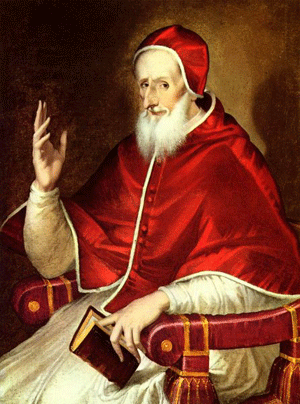 |
When
Maximilian II opened his first Diet at Augsburg in March, 1566, the grant of an
aid against the Turks was, as has been seen, the purpose which he had most
especially in view; and this he achieved. But he had also proposed in his
summons that the Diet should take into consideration the best means of
attaining to religious unity in the Empire. This meant different things to
different parties and to different men. There were fervent and uncompromising
Catholics--whose numbers were being steadily increased by the strenuous efforts
of Duke Albert of Bavaria and his Jesuit protégés--fully prepared to accept the Tridentine Decrees; and Cardinal Commendone appeared
at the Diet as Legate of the new Pope Pius V to call upon the Estates to carry
these Decrees into execution. But Commendone found that at the Diet neither
side had manifested any desire to put an end to the Religious Peace, and had
nearly quitted Augsburg in disgust. He does not seem to have perceived how
adverse the Decrees--in the matter of rules and restrictions concerning the
episcopate--were to the territorial interests of most of the Princes. It is
probable that Maximilian still thought the attainment of a common ground
possible. Herein he was in a sense before, in another sense behind, his times.
While he was willing to listen to the teaching of Cassander,
on the Catholic side Cassander’s earlier patron Duke
William of Jülich and the Elector of Cologne,
Frederick von Wied, whose election as Archbishop
remained unconfirmed by the Pope, were in agreement with the views no doubt
justly attributed to the new Emperor. But the future was not with this faction;
and in the year 1567 the Archbishop-Elector had to resign, and was followed by
a successor approved at Rome. When the Protestant Estates at the Diet proposed
the holding of a National Council, the Catholics repudiated this as
unnecessary, and fell back upon the validity of the Tridentine Decrees.
Meanwhile
the Emperor's immediate attention had been directed, and was again brought
back, to the preliminary problem of the suppression of Calvinism. As to this,
he and the Catholics had not unnaturally expected the Protestant Estates to
take the first step. But the Lutherans on their side hesitated to press home
directly the exclusion of the Elector Palatine, Frederick III, from the
benefits of the Religious Peace, although they were agreed not to include him
among the signatories of the demand for a National Council addressed by them to
the Emperor, unless he should previously have accepted a formula settled by
them as to the true doctrine of the Eucharist. And it was now that the moderate
policy, coupled no doubt with the territorial interests, of the Elector of
Saxony decided the issue; for the Grumbach troubles were not yet at an end, and
menaced the Palatine and Saxon Electors alike. The Emperor, approving of
Frederick III's attitude in the Grumbach question, hereupon contented himself
with admonishing him on his unlawful processes of reformation; and, though the
meeting of Protestant Estates denounced his Sacramental views, the more general
assault upon his position broke down. The result was, in a word, that the
Elector Palatine and the cause of Calvinism came forth from the Diet stronger
than before; for room was now left them for further expansion in the Empire,
and the breach between the Calvinists and the Lutherans had so far not been
formalized. At the same time the cause of Protestantism was weakened by the
perpetuation of discord and disunion in its midst. While Calvinism was left
untouched, the divisions among the professed Lutherans were unhealed. The
Ernestine John William restored Flacianism of the
purest water at Jena; and doctrinal controversies recommenced between Electoral
and Ernestine Saxony. Duke Christopher of Württemberg in 1568 put forth a
Concordia, drawn up with such brevity by Jacob Andreae that its acceptance by both Philippists and Flacians seemed possible; but neither the missionary
efforts of its author, nor the countenance of Duke Julius of Brunswick-Wolfenbüttel and of the Landgrave William of Hesse-Cassel, nor the goodwill of the Emperor himself,
could bring about its general acceptance. In the meantime the
Counter-reformation, in Bavaria and elsewhere, continued its course ; and the
day seemed approaching when it was from the Catholic side rather than from the
Protestant that aggressive movements were to proceed.
During
the interval between the Augsburg Diet of 1566 and that of Speier in 1570 the progress of the religious conflict in France and in the Netherlands
made it more and more necessary for the German Protestants to decide on their
bearing towards it. Necessarily, this must largely depend on the attitude of
the Emperor and the consequent chances of an intervention on the part of the
Empire. In the earlier part of this period, at all events, such an intervention
still seemed possible; for Maximilian had not as yet made it clear how he would
shape his conduct towards Spain. Meanwhile, the tortuous policy of the French
government in these years was likewise perplexing to the German Protestant
Princes. The overtures which it made to them in 1567 were well understood to be
prompted by no sincere goodwill towards the Protestant cause; and though some
of them, at meetings held in that year at Heidelberg and Maulbronn under Palatine and Hessian direction, resolved on a French alliance, the ground
was cut from under their feet by the outbreak in September of the Second French
Religious War. But the Elector Palatine Frederick III better understood the
nature of the situation in France, and had made up his own mind. In December,
1567, he allowed his ambitious second son, John Casimir,
who by his early residence in France seemed fitted for the task, to lead a
mercenary force of 8.000 horse and a regiment of foot to the assistance of
Condé; all envoy sent to Heidelberg to protest in the name of the Emperor was
put off with empty excuses. The diet was cast; for not only was the result of
the French Religious War materially affected by the fact of this reinforcement
of the Huguenots; but the future policy of the Palatinate was pledged by this
act, as Frederick and his counselors meant it to be; and to them, in the
transactions which followed, the moral as well as the actual leadership of the
German Protestants proved to have passed. When in 1567 William of Orange
resolved on the attempt to shake off the yoke of Alva from the Netherlands, his
appeal to the German Protestant Princes to bring about the intervention of the
Empire was coldly received by them all with the exception of the Elector
Palatine. When in 1568 Orange returned, this time as a fugitive, to Germany,
Frederick III alone came forward to support him with a loan, to which Landgrave
William of Hesse-Cassel afterwards added a
contribution. But even before the dispersal of Orange's liberating army, the
overbearing action of Alva, and his demand for the expulsion of the fugitives
who were crowding into the German north and north-west, had caused great
uneasiness among Catholic as well as Protestant Estates. In September, 1568,
the Rhenish Electors appealed to Maximilian to adopt
such action as might check the Spanish proceedings in the Netherlands; and it
is noticeable that the Electors of Saxony and Brandenburg added further
representations on their own behalf.
|
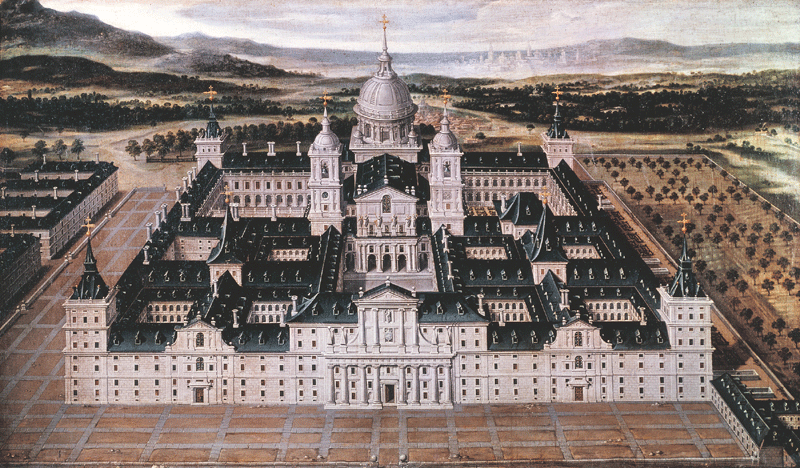 |
Maximilian
had many considerations to balance against one another; and in favor of
intervention the strongest was perhaps the religious condition of his own
hereditary dominions. We have seen how widespread the advance of Protestantism
there had been before his advent to the Imperial throne, and how his own
conduct in the matter of religion had been favorable to this advance. Since his
accession Protestant feeling had continued steadily to grow in Austria; and,
partly owing to a consciousness that the heavy taxation which the Estates had
to undergo to meet the cost of the Turkish war warranted some concession in
return, this feeling rose to its height in 1568. Maximilian would have
preferred a scheme of comprehension on the lines favored by his father; but the
nobles of Lower Austria insisted on the right of a free exercise of the
Augsburg Confession on their lands; and this definite right was conceded to
them (August, 1568), the towns, as more or less dependent on the government,
holding aloof. The elaboration of a code of religious worship and
administration (agenda) for what was intended to be little or nothing short of
an established territorial Church was entrusted to David Chytraeus,
a Lutheran divine of unimpeachable orthodoxy, but of a conciliatory
disposition; and the Emperor amended the draft in a similar spirit towards the
Church of Rome. It may be added that a similar concession was made to
Protestant feeling in Styria, where Chytraeus was
likewise employed in 1573; while in Upper Austria, where the Estates refused
Maximilian's agenda, he had to content himself with leaving alone what he could
not remedy, the use of the Cup by the laity being of course maintained. To the
religious developments in Bohemia reference will be made in another place; in
Hungary also, so far as the royal authority of Maximilian extended,
Protestantism was allowed to advance unhindered.
It was
during the negotiations as to the religious concessions to be made by the Emperor
to the mainly Protestant nobility of Lower Austria that the embassy of the
Electors urging him to intervene in the affairs of the Netherlands arrived at
Vienna. There can be no doubt that Maximilian personally sympathized with the
complaints on which this request was based, and that he would gladly have seen
the troubles in the Provinces ended by the dismissal of the Spanish troops and
an amicable settlement of religious and other differences. Furthermore, he was
certainly prepared to undertake such a settlement himself, for the Netherlands
had never ceased to attract him; and we know that before the actual outbreak he
had been at least inclined to offer himself as peacemaker. He now
unhesitatingly transmitted to Philip the representation of the Electors with a
strong recommendation in their favor; and in August, 1568, he sent his brother
Archduke Charles to Spain, to renew the proffer of the Emperor's personal good
offices in bringing the troubles of the Provinces to a close.
Archduke
Charles was relieved of the task of executing his other commission--that of
pleading for Don Carlos--by the death of that unfortunate prince (July 23,
1568). This tragic event, it cannot be doubted, exercised a most important
influence upon Maximilian II, particularly in his relations to the religious
question. The death of the heir to the Spanish monarchy was anything rather
than unforeseen; but there is a vast difference between expectation and event.
Henceforth Philip showed himself much more desirous than before of strengthening
the bonds between the two branches of the House of Habsburg; and, in return,
the future interests of his dynasty became paramount with Maximilian. While
Philip coldly rejected the proposals brought by Archduke Charles as to the
troubles in the Netherlands, he was ready to discuss with him marriage projects
of signal moment for the future of the Austrian line. The proposed marriage of
his infant daughter to one of Maximilian's numerous sons must inevitably be
long delayed in execution; but already in 1570 Philip married the Emperor's
daughter Anne as his fourth wife. Obviously--even if the report that Philip
sent warnings to his kinsman was not based on authentic data--so close a
connection with the King of Spain implied an unimpeachable orthodoxy, and could
not fail to react upon the relations between the Emperor and Pope Pius V, who
was so "well contented" with Philip's treatment of the Low Countries.
The friendly influence of the Pope became of the most direct value to
Maximilian when the latter began to speculate on the chances of recovering the
throne of Poland for himself or for one of his sons.
It is
true that the matter of the Lutheran agenda for Lower Austria, after the
protests of the Papal Nuncio Commendone had been met by a suspension of
proceedings in November, 1568, was quietly taken up again and slowly and
secretly carried to its conclusion by January, 1571. The Lower Austrian
nobility were now both for themselves and for their subjects empowered to
exercise their religion in accordance with the Augsburg Confession in its
original form ; and a decree followed promising the extension of this
concession to the nobility of Upper Austria also.
But while
in this matter Maximilian's policy of delay and secrecy seems to have beguiled
the Pope and King Philip, he had been found ready to abandon the proposed
intervention of the Empire in the affairs of the Netherlands. After the
recommendations of the Electors had found their way to Spain, they had there
been dispersed into empty air. The schemes for an intervention lost all
Imperial basis, and were exchanged for the design of a great Protestant
offensive combination in which England, the Scandinavian Powers, and even
Switzerland, were to play their part as well as the insurgent Protestants in the
Netherlands and France. The Thirty Years' War casts the shadow of its shifting
designs back over nearly half a century; and the imagination of the
doctrinaires of Heidelberg was already equal to the lighting-up of a war which
would envelope the greater part of Europe in its flames.
A Scene of the Thirty Years War
-Ernest Crofts |
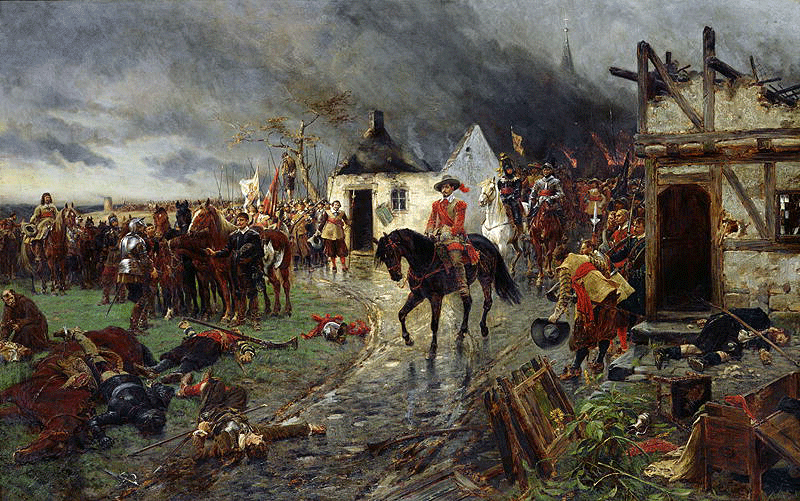 |
John Casimir, Count Palatine of Pfalz-Simmern (1543-1592) |
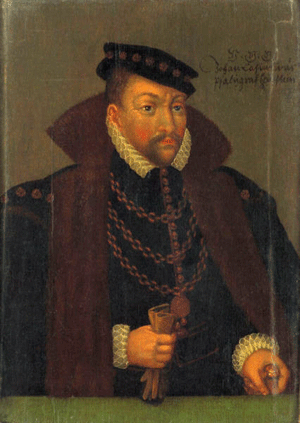 |
John Casimir, whose own share of the salvage from this general
conflagration was to consist of the three bishoprics of Metz, Toul, and Verdun, was about this time betrothed to a
daughter of Augustus of Saxony; and the Saxon Elector was in conjunction with Brandenburg
induced to assemble a meeting of ambassadors of Protestant Princes at Erfurt
for the discussion of the high-flown Palatine proposals (September, 1569). But
the time was not ripe; the Brandenburgers took the
lead in repudiating the designs put forward by the presiding Palatines; and
nearly all the other ambassadors, including the Saxon, followed suit. In the
same year a counter-attempt was made by the Archbishop of Trier to form a
combination which should include the Rhenish Catholic
princes and the Spanish Netherlands, and cooperate with the Landsberg Alliance, headed by Bavaria, which had just been renewed for seven years.
Philip would willingly have inflated this design into a league of the whole
Catholic West. But the Emperor Maximilian II, while pretending to favor this
proposal, contrived to frustrate it; and after an equally futile attempt of
Augustus of Saxony to convert the Landsberg Alliance
into a league of both Confessions which would ensure the neutrality of the
Empire in the Netherlands conflict, it was joined by nobody but the Electors of
Mainz and Trier.
The
effects of the change in the general tendencies of Maximilian's policy showed
themselves distinctly enough at his second Diet, which met at Speier in July, 1570, and in the transactions which ensued,
down to the opening, six years later, of his last Diet at Ratisbon. In
consequence of the excesses committed by the troops led by William of Orange,
John Casimir, and other Princes into the Netherlands
and France in their transit through the Archbishopric of Cologne and other
districts of western Germany in 1568 and 1569, a Deputationstag had called upon
the Diet to apply an effectual remedy. But the Emperor's desire that it should
henceforth be within his discretion to allow or disallow the levy of troops for
foreign service--in other words that the direction of the policy of the Empire
as to the French and Netherlands wars should henceforth be placed in his
hands--was by no means to the taste of the Estates. It was merely provided that
he should in future be informed of any such levy ; and his proposals for
organizing the defense of the borders fell to the ground. The mistrust implied
in these proceedings of the Diet is in part explicable by the fact that, while
it was sitting, the marriage of Maximilian's daughter Anne with King Philip was
solemnized (November). It is true that in the same month the Emperor's daughter
Elizabeth was married to Charles IX of France, and that about this time the
policy of Catharine de' Medici took a favorable turn towards the Huguenots, and
towards the cause of the Netherlands, on behalf of which Orange was at this
time continuously canvassing German support. The more ardent spirits among the
German Protestants were for a time caught by the fantastic suggestion that
Charles IX should be set up as successor to Maximilian on the Imperial throne,
with Henry of Anjou as Roman King. But though these schemes were resumed after
the first horror excited by the Massacre of St Bartholomew (1572) had subsided,
and after Henry of Anjou had actually ascended the Polish throne (1573), they
were too artificial to have a chance of success; and in the end the sympathies
and hopes of militant German Protestantism attached themselves once more to the
Huguenots and to Henry of Navarre, while the conservative and cautious section
headed by Augustus of Saxony became more conservative and cautious than ever.
In September, 1575, with the aid of English money, John Casimir concluded an important treaty with the Huguenot leaders for conducting 16,000
German and Swiss mercenaries into France; and in December he marched into that
country, where the presence of his force helped to bring about the hollow peace
which ended the Fifth Religious War (1576).
|
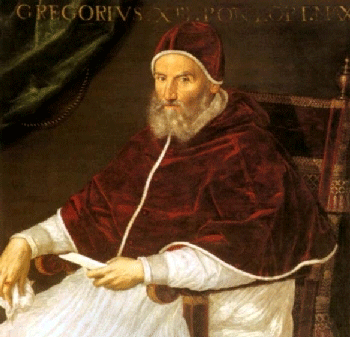 |
While the
withdrawal of Maximilian from an attitude of unmistakable friendliness towards
the progress of Protestantism at home and abroad had failed to benefit the
interests of Catholicism as represented by Spain abroad, it could not but
encourage the advance of the Catholic Reaction at home, and at the same time
deepen the mistrust between the Imperialist section of the Protestant Estates,
and that which cast to the winds all care for the Empire and its integrity. The
interests of the Counter-reformation in Germany were probably better served by
Gregory XIII, who had in 1572 succeeded to the chair of St Peter, than by Pius
V, who had fallen in with the conceptions of Philip II. But though Gregory came
under the influence of fanatics, he was not one himself; and in Germany he
favored more gradual and in particular educational processes such as were set
in motion by the Jesuit Order, whose collegium Germanicum at Rome he reendowed, and whose agents he
caused to be sent forth to the annual number of one hundred. One of the
Catholic centers in Germany whence a large number of pupils for the great Roman
seminary were drawn was Fulda. Here Abbot Balthasar Gravel had by the year 1573 persuaded himself that it was his duty to bring
back all his subjects to communion with Rome, and, encouraged by the Pope,
though under the protest of his Chapter, introduced the Jesuits to Fulda, where
they set up a seminary. This was followed by the expulsion of all Protestant
preachers, and of all officials clerical or lay who refused to accept the Tridentine Decrees; and by 1576 the restoration of
Catholicism in the abbacy was complete. In indignation at the Abbot's
proceedings, the nobility of his principality and his Chapter combined to force
him to renounce his abbacy in favor of the Bishop of Würzburg, who under the
title of Coadjutor assumed its administration. The Abbot appealed to the
Emperor Maximilian, who declared him to have been illegally coerced; but it was
not till six years later that he was replaced in all his rights. The Bishop,
the nobility, and the city of Fulda had then to pay a considerable
compensation. Thus in the end this important position was reconquered by the Catholic Reaction. The Bishop of Würzburg, Julius Echter von Mespelbrunn, who plays so ambiguous a part in the
earlier of these transactions, had by that time secured the complete success of
the Reaction in his own prince-bishopric.
The
Protestant clergy and their influence were likewise expelled from the Eichsfeld--a district in the electorate of Mainz, environed
by Protestant territories. Here too the Jesuits found a new centre whence they
spread into the sees of Paderborn and Hildesheim. The
Archbishop of Trier and the Bishop of Worms were likewise active in suppressing
Protestant worship; and, but for the Elector Palatine, some of the lesser Free
Towns in these parts, where the Catholic interest prevailed, would have
proceeded to imitate the example of these ecclesiastics. At the close of
Maximilian's reign the Counter-reformation was ready for those further and
still more provocative advances to which it was to proceed in the reign of his
son.
Meanwhile,
among the Protestants neither the steady advance of the Counter-reformation at
home, nor the deadly earnest of the religious conflict abroad beyond the
borders of the Empire, prevented the continuous growth of controversy and
discord. Before the reign of Maximilian had ended, the mutual aversion between
the Saxon and Palatine Electors had been intensified into angry antagonism.
Family jealousies and quarrels added, or were to add, to the bitterness between
them. John Casimir's wife, the Saxon Elizabeth, a
bitter anti-Calvinist, stirred up strife between her father and her husband and
father-in-law. A violent quarrel also arose out of the unfortunate second
marriage of William of Orange to Anne, the niece of Elector Augustus, and was
heightened through his third marriage, negotiated by Frederick III, with
Charlotte de Bourbon. But, before this, Augustus had made a final declaration
of his hostility to Calvinism. The prevalent religious opinion in the
electorate was undoubtedly anti-Calvinistic, though its Lutheranism under
Augustus had not been of the rigid or Flacian type,
such as obtained in Ducal Saxony, whence in 1573, on high-handedly assuming the
guardianship of the two sons left behind him by John William, Augustus had
summarily expelled the Flacian clergy and University
professors. But in 1574 he suddenly became aware of the influence gained in his
Court and Council by the Wittenberg theologians, whom Melanchthon's teaching
had disposed to an attitude of conciliation or compromise vehemently resented
by the rigid Lutherans, and among them by the Elector's own consort. In an
access of despotic rage the Elector hereupon conceived that he had discovered a
crypto-Calvinist conspiracy, and proceeded with cruel severity against its
supposed members. His foremost Privy Councilor, Cracow, was tortured and put
into prison, where he soon died; the Elector's body-physician languished in
custody for ten years; and others were treated with similar rigor. Then,
determined to extirpate the pest from his land, he caused a declaration of
belief concerning the Eucharist (the so-called Torgau Formula) to be drawn up and imposed upon all persons suspected of Calvinism,
especially the professors and clergy of Wittenberg and Leipzig; and a series of
expulsions ensued. From this time forward Augustus became more and more rigidly
Lutheran, and sought to give the same character to the Saxon Church. His direct
antagonism to the Elector Palatine reflected itself in his estrangement from
the cause of the Huguenots and the Netherlands Protestants. The representatives
and promoters of the Catholic Reaction now saw their natural opponents divided
into two camps directly adverse to one another; and the effect of this division
speedily showed itself in the settlement of the crucial question of the
succession to the Empire itself.
Maximilian,
though only fifty years of age, was infirm in health; and there was every
reason for settling the succession as speedily as might be. After Augustus of
Saxony had visited the Emperor in 1573, the Palatine scheme of delaying the
election of his successor till after his death was swept aside; and Frederick
III had to reconcile himself as best he might to the consensus of all the other
Electors in favor of choosing as Roman King the Emperor's eldest son Rudolf,
who had been crowned King of Hungary in 1572. His succession to the Bohemian
Crown was secured by his coronation on September 6, 1575; the assent of the
Lutheran majority which dominated the Diet having been purchased by a verbal
promise on the part of both father and son to approve the adoption of a
Bohemian Confession, so comprehensive as to include the tenets of the Bohemian
Brethren. Thus a complete religious settlement was here postponed by a
provisional understanding. At Ratisbon, where the Electors assembled in
October, 1575, Maximilian was still confronted by a difficult task. Interest
was concentrated on the terms of the Wahll capitulation
which would precede Rudolf's election as Roman King, and which the audacious
Palatine statesmen had at first aimed at making a kind of charter of religious
liberty for Protestantism both within and beyond the borders of the Empire.
Now, they had moderated their demands; and for a time it seemed as if they
would carry Saxony and Brandenburg with them in exacting from Rudolf the
twofold promise, that the reservation ecclesiasticum should be cancelled, and the declaration of
Ferdinand guaranteeing to adherents of the Augsburg Confession the continued
exercise of their religion in the lands of Spiritual Princes confirmed.
Undoubtedly, the whole question of the expansion of Protestantism in the Empire
was involved in the former demand, and the latter distinctly implied that the
Catholic reaction allowed at Fulda and in the Eichsfeld,
and imminent in the electorate of Cologne, should not continue to be permitted.
But in the end the resolute negative with which the spiritual Electors met
these proposals, and probably his own reluctance to act with the Palatine,
induced Augustus of Saxony to give way; so that, while the settlement of these
matters was left over for the Diet, Rudolf, without having entered into any
engagement concerning them, was unanimously elected Roman King (October
17,1575).
The
Emperor Maximilian had never had head and hands fuller of projects intended to
enhance the power and influence of his dynasty than when he met his last Diet
at Ratisbon (June 25, 1576). The Crown of Poland had been offered to him by a
party which regarded him as representing the Catholic interest in opposition to
the Protestant Stephen Báthory; and Maximilian cherished the hope that the Diet
would approve the Polish design, besides granting him a liberal aid for the Turkish
war which would be the inevitable result of its success. But the Diet had no
wish to provoke the Turks to another series of costly campaigns; and even for
the mere defense of the frontier Maximilian would have found it impossible to
secure the requisite supply, had not Augustus of Saxony defeated the Palatine
design of once more making the Turkish grant dependent on the satisfaction of
the Protestant demand for the confirmation of Ferdinand's declaration. Almost
unsupported, Augustus (fortified by a recent visit to Duke Albert of Bavaria)
held out against the general wish of the Protestant Princes to press this
demand upon the Emperor; and the breach between the Saxon and the Palatine
policy had become wider than ever.
But
though the Turkish aid was granted, and to an unusually large amount, the
Polish scheme of Maximilian had to be dropped. He would have been abundantly
consoled for this, had he been able to carry into fulfillment another design
which had been a chief ambition of his life, and which even now there seemed a
prospect of his realizing. For the last three years he had on his own account
taken up the scheme of an effective mediation in the affairs of the
Netherlands, to be conducted by himself in cooperation with the leading Princes
of the Empire. Secretly he had cherished the hope that a member of his family,
perhaps his youthful son Matthias, might be summoned to the government of the
Provinces, which though now in open insurrection had not yet formally renounced
their obedience to Philip's rule. An agent of the States, who were on the point
of concluding the Pacification of Ghent, opportunely arrived at Ratisbon to
urge some kind of intervention in the war on the part of the Emperor; and the
Diet resolved that the Emperor's mediation should be offered to the Spanish
government.
Many
opportunities had come to Maximilian in his life and been lost to him ; this,
which would have exposed his European statesmanship to a test such as it had
never fairly met, was snatched from him by the hand of death. While the message
of dismissal was being read to the Diet the Emperor lay dying. He refused to
receive the last Sacraments of the Church of Rome, and, in the words of one of
those who stood disappointed at his death-bed, "died as he had lived"
(October 12, 1576).
|
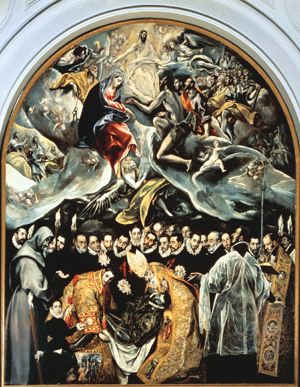 |
The
situation which Maximilian II left behind him at home in the Empire was one
which could not be remedied by good intentions, even if these sprang from a
singularly clear intelligence and a generous aversion from intolerance and
bigotry. In his last message to his last Diet he had declared himself to be, in
the religious dispute, of no party; but if he had sought to place the Imperial
authority above party by effecting a clear and equitable revision of the
Religious Peace, it might still have proved possible to dispel some at least of
the gathering clouds. As it was, the only settlement to which all parties could
appeal was left dangerously open to misinterpretation and neglect; for the
Protestant Princes were continuing their assault upon Catholic foundations; and
Catholic authorities were beginning to force back Protestant subjects into the
forms of worship of the Church of Rome, or to drive them from house and home.
The Empire confessed its impotence to interpret, to pronounce, even to protest;
and inevitably the mutually adverse parties and interests were looking for
sympathy and support in return for services rendered or to be rendered beyond
the frontier. Thus, a full generation before the outbreak of the Thirty Years'
War, its germs are already visible in the reign of Maximilian II, who in the
face of the conflict was unequal to choosing his side.




